April
2012/1 Download Roundup
Brian Wilson
The previous Roundup � March 2012/2 � is here
and earlier editions are indexed here.
There are two well-deserving Downloads of the Month this time
� one chosen by Dan Morgan and one of my choosing.
The most exciting recent development has been the decision by
Linn and Universal to offer 24-bit downloads from the Decca
and DG catalogues. We’ve reviewed several of these � the
Berlioz Symphonie fantastique is Dan�s Download of
the Month � and I’m looking forward to what�s yet to
come. Sadly, their reissue of Charles Mingus on UNI033,
which I was looking forward to hearing, is a delight denied
to UK listeners, as it�s available only in certain countries.
Hyperion have also now added 24-bit versions of some of their
most recent recordings to their download offerings � see the
Chisholm review below.
The MusicWeb International page on download availability is
still a work in progress � in a sense it always will be, as
more sites become available and some disappear and new formats
appear. It�s no longer true, for example, that only wav files
can be burned to CDR for reproduction on audio equipment � programmes
such as Winamp will burn mp3, wma and flac and the iTunes jukebox
will burn mp3, wav and alac and convert wma (but not flac) to
wav for burning. You will, however, find many 24-bit recordings
too large to burn to CDR. Visitors will find the section on
commercial sites leaner but more up-to-date � here.
Downloads
of the Month
Hector BERLIOZ (1803-1869)
Symphonie fantastique (1830)
Concertgebouw Orchestra/Sir Colin Davis
rec. January 1974, Concertgebouw, Amsterdam
UNI006 [55:00] � from Linn
Records (mp3, 16- and 24-bit lossless)
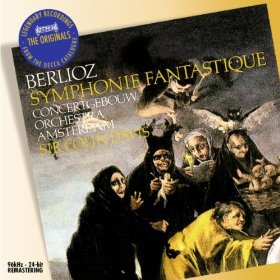 As
with the Decca/Solti Mahler Eighth this Philips recording of
Berlioz�s Symphonie fantastique is an undisputed classic
and a firm favourite of mine for years. Part of the allure of
this reading is Davis�s unrivalled understanding of the composer�s
complex musical persona; indeed, he brought a proselytizing
zeal to the entire cycle � recorded in the 1960s and 1970s �
that�s largely absent from his much more recent remakes for
LSO Live. Naturally I was keen to hear how this already fine,
much-lauded version has responded to the high-res treatment.
As
with the Decca/Solti Mahler Eighth this Philips recording of
Berlioz�s Symphonie fantastique is an undisputed classic
and a firm favourite of mine for years. Part of the allure of
this reading is Davis�s unrivalled understanding of the composer�s
complex musical persona; indeed, he brought a proselytizing
zeal to the entire cycle � recorded in the 1960s and 1970s �
that�s largely absent from his much more recent remakes for
LSO Live. Naturally I was keen to hear how this already fine,
much-lauded version has responded to the high-res treatment.
Remarkably well, is the short answer. One of the most obvious
improvements over earlier incarnations is the added body and
resonance in the lower strings. But there�s more, much more;
the sense of an airy, three-dimensional performing space has
never been greater, while overall focus and instrumental separation
are frankly astonishing. Quite apart from these most welcome
details the recording now seems to have a more compelling narrative,
the details of Berlioz�s score rendered with rare naturalness
and poise.
After those reveries and passions �Un bal’ has a surprisingly
high goose-bump count; textures are simply gorgeous and the
music has a reach-out-and-touch �presence’ that would be
impressive in a 21st -century recording, let alone one made
almost 40 years ago. And no-one could be unmoved by the sheer
beauty and line of the �Scène aux champs�, blessed as
it is with the most refined wind and string playing; as for
the quiet pizzicati, they’re more keenly felt than
ever before. Those who remember the advent of CD will recall
critics remarking on how the new medium removed a veil from
the performance; well, that�s precisely what�s happened here.
This does mean that Davis�s occasional grunts are more audible,
but that matters not a jot when the music emerges as fresh and
newly minted as it does here.
The Philips engineers really surpassed themselves with this
pioneering series, and the unforgiving world of high-resolution
audio confirms how right � and how musically astute � their
initial judgments were. Just listen to those ear-pricking passages
for cor anglais and oboe, and to the shiversome rumble of timps
as the storm clouds gather. Really, this is Berlioz playing
of the highest order, the grotesque �Marche aux supplice’
as nightmarish as I’ve ever heard it. In particular the
weighty, well-blended brass blaze with even greater ferocity
than I remember from the demonstration-quality LP and subsequent
CDs.
What a hugely theatrical reading this is, the very antithesis
of that fitful, foursquare Nézet-Séguin performance
I reviewed recently. Davis�s pacing is pretty much ideal, and
he builds � and maintains � tension very well indeed. And when
the blade does fall the paroxysms that follow will blow your
windows out. Remarkably, all this is achieved without the recording
being made to sound self-consciously �hi-fi’; it�s a captivating,
real-world performance from start to finish, free of the expressive
nudges and liberties that disfigure so many versions of this
piece.
The imagined �eye of newt and toe of frog’ milieu of �Songe
d’une nuit du Sabbat’ was always a frisson-inducing
high point of this recording, and it doesn’t disappoint;
those spooky col legno strings are more chilling than
ever before, the bass deeper and more uncompromising. As for
the bells, they ring out with renewed confidence and clarity,
the ensuing Dies irae wonderfully spacious and sonorous. Even
in the tuttis there�s no hint of overload or compression, the
sound expanding effortlessly to the last bar.
There�s so much to absorb and delight here; quite apart from
Davis�s reading and the technical wizardry on display in this
Studio Master, we get to hear one of the world�s great orchestra
in fine form and full cry. What a distinctive, burnished sound
they made then � recent recordings have been comparatively disappointing
� and how they relish this eccentric score. This is by far the
most lucid and involving incarnation of an already fine recording,
and a punch on the nose to those who say high-res re-mastering
is just a gimmick. Indeed, if Universal choose their recordings
with care and re-master them as sympathetically as they’ve
done thus far, we’re in for a treat.
Alchemy or snake oil � call it what you will � this Studio Master
is musical magic.
Dan Morgan
http://twitter.com/mahlerei
[The Concertgebouw remake overshadowed Davis�s fine earlier
recording with the LSO � not to be confused with the recent
LSO versions to which Dan refers � but that�s no longer available
on CD and the downloads from hmvdigital.com and amazon.co.uk
cost more, at £7.49, than their downloads of the Concertgebouw
version at £3.97 and £4.99 respectively. As so often,
the economics of downloading elude me here. BW.]
Alban BERG (1885-1935) Violin
Concerto (�to the memory of an angel’) [27:58]
Ludwig van BEETHOVEN (1770-1827)
Violin Concerto [40:51]
Isabelle Faust (violin)
Orchestra Mozart/Claudio Abbado
HARMONIA MUNDI HMC902105 [68:51] � from emusic.com
(mp3)
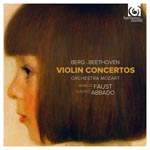 Having
heard the Berg on Radio 3 CD Review, I couldn’t wait to
request a review copy from classicsonline.com,
though that will come at a better bit-rate than the instant
gratification from emusic.com and with the pdf version of the
booklet. Actually, though it�s only at around 220kb/s, as opposed
to classicsonline.com�s regular 320kb/s, the emusic.com download
doesn’t sound at all bad and, at £2.20, it could
also have been my Bargain of the Month.
Having
heard the Berg on Radio 3 CD Review, I couldn’t wait to
request a review copy from classicsonline.com,
though that will come at a better bit-rate than the instant
gratification from emusic.com and with the pdf version of the
booklet. Actually, though it�s only at around 220kb/s, as opposed
to classicsonline.com�s regular 320kb/s, the emusic.com download
doesn’t sound at all bad and, at £2.20, it could
also have been my Bargain of the Month.
Even if you already have the Beethoven, as most collectors will,
it�s worth investing your £2.20 � or £7.99 from
classicsonline.com, for that matter � for the sake of the Berg
alone: it�s the most compelling version of this work that I’ve
heard, though it doesn’t pull any punches for the sake
of making the work sound more amenable. The Beethoven is good,
too, though it follows too hard on the heels of the Berg for
my liking.
If you’re still undecided which version to download, you
may be swayed by the fact that the classicsonline.com version
comes with the booklet of notes.
If you prefer to have the Berg in the company of other 20th-century
works, try Zehetmair and Holliger, coupled with concertos by
Hartmann and Janá?ek on budget-price Warner Apex 0927408122
� see review
� download from amazon.com or hmvdigital.com for £4.99,
a useful but not massive saving of around £1 on the UK
price of the CD.
Reissue
of the Month
Mily Alexeyevich BALAKIREV (1837-1910)
Symphony No.1 in C [40:32]
Royal Philharmonic Orchestra/Sir Thomas Beecham � rec. 1960.
ADD/stereo
BEULAH 16-18BX11 [40:32] � from eavb.co.uk
(mp3)
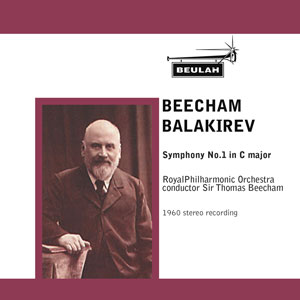 This
has been one of my Desert Island Discs for nearly 50 years,
since first a friend at University played it to me and I rushed
out to buy it the next morning � a wonderful bargain then on
the HMV Concert Classics label (SXLP30002) and available in
stereo too. Scandalously, though it was briefly available on
CD on the EMI Studio label, coupled with a mono recording of
Tamara, it seems currently not to be around, even as
a download, so I’m hugely grateful to Beulah for reissuing
it.
This
has been one of my Desert Island Discs for nearly 50 years,
since first a friend at University played it to me and I rushed
out to buy it the next morning � a wonderful bargain then on
the HMV Concert Classics label (SXLP30002) and available in
stereo too. Scandalously, though it was briefly available on
CD on the EMI Studio label, coupled with a mono recording of
Tamara, it seems currently not to be around, even as
a download, so I’m hugely grateful to Beulah for reissuing
it.
The music is enchanting � to hear it is to fall in love with
it � the performance is one of those Beecham specials where
good music is turned into a masterpiece, and the recording sounds
fine. I compared it with the EMI reissue and found little difference
between the two � perhaps EMI got a little more stereo directionality
and a touch more bloom out of the master tape, but I could live
perfectly happily with the Beulah and it�s currently the only
show in town anyway. In 1962 the stereo LP cost £1/7/7
� £1.37 but equivalent to well over £30 today; the
mono was a little cheaper but the Beulah reissue is incredible
value by comparison at £3.00 ($4.76).
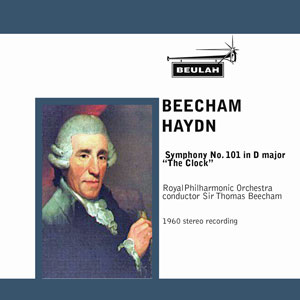 There�s
more Beecham magic at work in other reissues from Beulah
this month. His recordings of the Haydn London Symphonies
are still generally available on two budget price EMI Gemini
twofers, but that doesn’t diminish the value of the single
reissues of his recording of the �Clock’ Symphony, No.101
in D (5-8BX11
[28:22]), and No.103 in E-flat, the �Drum Roll’
(9-12BX11 [30:13])
made with the RPO in 1960. Whereas the first set, Nos.93-98,
were made in mono only, these symphonies from the second set
are in good stereo and Beulah�s re-mastering sounds every bit
as good as the classicsonline.com downloads of the EMI reissues.
By today�s standards, Beecham�s recordings, made with editions
already superseded for inaccuracy at the time, shouldn’t
work � but his innate sense of style shines through as much
as it ever did.
There�s
more Beecham magic at work in other reissues from Beulah
this month. His recordings of the Haydn London Symphonies
are still generally available on two budget price EMI Gemini
twofers, but that doesn’t diminish the value of the single
reissues of his recording of the �Clock’ Symphony, No.101
in D (5-8BX11
[28:22]), and No.103 in E-flat, the �Drum Roll’
(9-12BX11 [30:13])
made with the RPO in 1960. Whereas the first set, Nos.93-98,
were made in mono only, these symphonies from the second set
are in good stereo and Beulah�s re-mastering sounds every bit
as good as the classicsonline.com downloads of the EMI reissues.
By today�s standards, Beecham�s recordings, made with editions
already superseded for inaccuracy at the time, shouldn’t
work � but his innate sense of style shines through as much
as it ever did.
I recommended the classicsonline.com downloads of the two EMI
Gemini sets some time ago but I’m going to have to rescind
that recommendation because their prices have been increased
to an unfeasible £13.98 each � almost twice the price
at which the parent CDs are available in the UK. You’ll
find them to be better value at £6.99 each from hmvdigital.com,
or as part of a 12-CD album of Beecham�s Haydn and Mozart for
£22.99.
Classicsonline.com have the earlier mono recordings of Symphonies
Nos. 94 and 103 which Beecham made for Columbia (CBS) in 1951
for just £1.99. (Naxos Classical Archives 9.80165
� not available in the USA and some other countries.) The sound
is a bit dry and recessed but tolerable.
Discovery
of the Month
Erik CHISHOLM (1904-1965)
Piano Concerto No. 1, Pìobaireachd (1932, rev.
1937) [33:33]
Piano Concerto No. 2, Hindustani (1949, re-orch. &
rev. 1953) [35:04]
Danny Driver (piano)
BBC Scottish Symphony Orchestra/Rory Macdonald
rec. 8-9 June 2011, City Halls, Candleriggs, Glasgow, Scotland
Pdf booklet included
HYPERION CDA67880 [68:37] � from hyperion-records.co.uk
(mp3, 16- and 24-bit lossless)
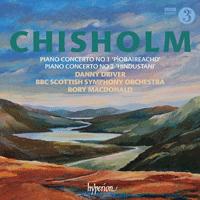 Erik
Chisholm? Haven’t heard of him? Well, neither had I until
I discovered Danny Driver�s Balakirev disc last year � review
� and decided to follow him on Twitter. Intrigued by his tweets
about Chisholm, I Googled for more information on this composer,
conductor and performer; Scottish born and influenced by the
folk music of his homeland he conducted the UK premieres of
Mozart�s Idomeneo and Berlioz�s Les Troyens. After
the Second World War he settled in Cape Town, where he was made
Dean of the university�s Faculty of Music.
Erik
Chisholm? Haven’t heard of him? Well, neither had I until
I discovered Danny Driver�s Balakirev disc last year � review
� and decided to follow him on Twitter. Intrigued by his tweets
about Chisholm, I Googled for more information on this composer,
conductor and performer; Scottish born and influenced by the
folk music of his homeland he conducted the UK premieres of
Mozart�s Idomeneo and Berlioz�s Les Troyens. After
the Second World War he settled in Cape Town, where he was made
Dean of the university�s Faculty of Music.
This download marks a double first for me; these concertos are
entirely unfamiliar, and they are among Hyperion�s first 24/96
downloads. It�s good to see that they’ve overcome their
initial reticence about high-res recordings � they bowed out
of SACD several years ago � and have joined the likes of BIS,
Linn, Chandos, Channel, Dacapo and many others in offering premium-quality
downloads, albeit at a premium price. That said Hyperion�s top-notchers
are priced at £15.60, which compares quite favourably
with the Chandos and Universal Studio Masters for instance.
But what of these two concertos? The first is subtitled �Pìobaireachd’,
which means ‘pipe music’. It�s a sinewy four-movement
work, whose trenchancy certainly explains why Chisholm was nicknamed
�McBartók’. The skirl of bagpipes can be discerned
in the opening bars, rising over a soft drum beat. It�s very
atmospheric and an immediate clue as to the ‘presence’
of Hyperion�s high-res recording. They’ve opted for a big,
bold sound that suits the music very well, but the downside
is that the piano is a little overwhelmed at times. As expected,
Driver is a thoughtful and persuasive player, and he sounds
quite magical in the Adagio�s misted glens.
This concerto is a most compelling work that yields a little
more each time one hears it. As for the orchestra they’re
in fine fettle, Rory Macdonald a sure guide through the concerto�s
crags and valleys. Chisholm�s control of his material is no
less certain, the piece moving towards a powerful, pounding
finale that�s intoxicating in its surge and sweep. Bravos all
round I’d say, although some might wish for more air around
the orchestra, especially in those massive, gnarled climaxes.
And what of the second concerto, subtitled ‘Hindustani’?
Completed in 1949 it was premiered at a contemporary music festival
at UCT the same year. Chisholm spent time in the Far East during
the war, and his interest in indigenous music explains in part
his use of different ragas in each of the concerto�s three movements.
In any event, there�s an oriental cast to the quieter passages
of the first movement � the pianist seems to have a more dominant
role this time round � and I had to marvel at Driver�s blend
of dexterity and feeling here. He sounds utterly at ease in
this music, especially in the exposed circularity of the Tema
con variazioni and the giddying whorls of the Rondo burlesca.
As with all unfamiliar works these may seem a tad intimidating
at first, but if the Bartók and Prokofiev concertos hold
no terrors for you then neither will these. Kudos to Hyperion
for taking a punt on Chisholm�s concertos, and for persuading
a pianist of Driver�s calibre to play them. Factor in impressive,
meaty sonics and you have a collection that deserves to do well.
As ever, the Pdf liner-notes are detailed and highly readable.
Off the beaten track, but emphatically worth the detour.
Dan Morgan
http://twitter.com/mahlerei
As Dan says, this is well worth exploring. Though I’m not
a fan of the highland pipes which lend their name to the first
of these concertos (pronounced pibroch) I do like the
implied Scottishness of some of the music � I’m a sucker
for Max Bruch, who never got nearer to the border than Liverpool,
but encapsulated Scottish folk songs into his Scottish Fantasy,
a work which deserves to be as well known as his first Violin
Concerto.
I enjoyed the Pìobaireachd concerto but I’m
glad that no-one played it to me as an ‘innocent ear’,
because I wouldn’t have had a clue as to the composer,
or that of the Second Concerto. I’m also a sucker for the
east-meets-west of Ravi Shankar�s Sitar Concerto, so I also
welcome this first recording of the ‘Hindustani’ Concerto,
though the Indian component is less obvious than the Scottish
in the First Concerto.
As Dan had downloaded the 24/96 version � less expensive than
many suppliers are asking for such quality, but still pretty
pricey � I tried the more economically priced ‘ordinary’
16-bit version and was more than happy with the quality of the
sound. Whichever version you choose, we have reason to be grateful
to Hyperion for taking another of their typical gambles � this
one certainly deserves to pay off.
Freebies
of the Month
Claude DEBUSSY (1862-1918)
String Quartet in g minor, Op.10 [25:19]
Maurice RAVEL (1875-1937) String
Quartet in F [28:01]
Claude DEBUSSY Golliwog�s
Cakewalk [3:16]
St Petersburg String Quartet: Alla Aranovskaya, Alla Krolevich
(violin); Boris Vayner (viola); Leonid Shukayev (cello)
MARQUIS CLASSICS MQ1379 (MAR379) [56:15] � from theclassicalshop.net
(mp3 and lossless)
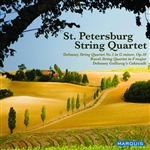 Very
competent and evocative performances, well recorded; if they’re
not the last word in the interpretation of these two wonderful
works, they are certainly worth adding to your collection, especially
if you don’t yet have recordings of them. They are very
welcome as free gifts � Chandos�s latest mp3 gift to subscribers
to their free online newsletter � and even worth considering
at the 25% discount that applied when I checked.
Very
competent and evocative performances, well recorded; if they’re
not the last word in the interpretation of these two wonderful
works, they are certainly worth adding to your collection, especially
if you don’t yet have recordings of them. They are very
welcome as free gifts � Chandos�s latest mp3 gift to subscribers
to their free online newsletter � and even worth considering
at the 25% discount that applied when I checked.
It would surely have been better to have placed the Golliwog�s
Cakewalk at the beginning; its jaunty mood sits ill after
the sultry mood of the quartets.
If you haven’t yet signed up for the newsletter, why hesitate?
Jiř�
GEMROT (b.1957) Piano Trio No.1 (2001) [17:27]
Public performance � performers or date not specified.
From gemrot.com (mp3)
 You’ll
find a biography of this Czech composer and a selection of free
downloads of his music here.
Click on mp3s for the downloads. I chose the Piano Trio No.1
(2001) at random, partly because the score is also available
� it appears that the other two trios will be added later. It�s
an attractive work, with clear antecedents in Czech composers
from Dvoř�k
to Martinů, though not sounding derivative. The
mp3 comes at 128kb/s only, but sounds well enough to give a
good impression of the music, more of which deserves to be taken
up by a recording company � perhaps Panton, for whom he is a
recording producer? All I could find in the UK catalogue was
his American Overture on Albany (TROY499)* and
a recording of his Violin Sonata on the Cube Bohemia label,
with music by other young Czech composers (CBCD2632).
You’ll
find a biography of this Czech composer and a selection of free
downloads of his music here.
Click on mp3s for the downloads. I chose the Piano Trio No.1
(2001) at random, partly because the score is also available
� it appears that the other two trios will be added later. It�s
an attractive work, with clear antecedents in Czech composers
from Dvoř�k
to Martinů, though not sounding derivative. The
mp3 comes at 128kb/s only, but sounds well enough to give a
good impression of the music, more of which deserves to be taken
up by a recording company � perhaps Panton, for whom he is a
recording producer? All I could find in the UK catalogue was
his American Overture on Albany (TROY499)* and
a recording of his Violin Sonata on the Cube Bohemia label,
with music by other young Czech composers (CBCD2632).
I listened to the American Overture from the Naxos Music
Library � an attractive but much less adventurous work than
the Piano Trio, designed to be more popular in its appeal. The
performance is also available on YouTube here.
You’ll also find some of Gemrot�s music available for streaming
from the Arizona Friends of Chamber Music, who have commissioned
some of his works � here.
* Download from emusic.com
for £0.42, or the complete album of recent Czech music
for £3.78 or, with pdf booklet, from classicsonline.com
for £4.99 or stream from Naxos Music Library.
Digital
Debut
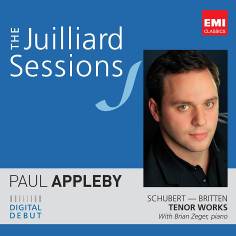 EMI
used to have a CD series entitled Debut; it now appears that
this has been replaced by a download-only set of EPs, each about
30 minutes in length, of performances by recent graduates of
the Juilliard School in New York and the Royal Academy in London,
available from iTunes for $4.99 (£3.95) each.
EMI
used to have a CD series entitled Debut; it now appears that
this has been replaced by a download-only set of EPs, each about
30 minutes in length, of performances by recent graduates of
the Juilliard School in New York and the Royal Academy in London,
available from iTunes for $4.99 (£3.95) each.
I’ve received review copies of the three Juilliard recitals,
all well worth investigating:
Pianist Conrad Tao plays a pair of Debussy preludes
� Book I/7, Ce qu’a vu le vent and BookI/11 La
danse de Puck - followed by Stravinsky�s Three Movements
from Petrushka (a piano arrangement of music from the
ballet of the same name), and closing with a work composed by
Conrad himself, entitled Three Songs � Smoke, Cocoon
and Catharsis.
Tenor Paul Appleby recorded a trio of Schubert
songs � Alinde, die Taubenpost and Nachtstück
� and Britten�s Seven Sonnets of Michelangelo, Op.22,
with accompanist Brian Zeger. In the Britten the distinctive
sound of Peter Pears is hard to shake from one�s head � now
available at budget price on Regis RRC1365: download
in mp3 from classicsonline.com.
Even Pears is not totally convincing � I see that AP was rightly
critical in 1956 � but Appleby�s accompanist, though good, is
no match for Britten himself.
It was cruel of me to compare Paul Appleby�s Schubert with the
Hyperion Schubert Lieder Edition � the whole point of
these EMI EPs is to publicise new talent and Appleby�s is well
worth publicising � but I did it partly because I wanted to
review some more volumes of this wonderful Hyperion series,
having made a fitful start some time ago. Anthony Rolfe Johnson
on Volume 37 of that series gives an ideal performance of die
Taubenpost, with diction so clear that there is no need
to follow with the libretto.
He and Graham Johnson adopt an ideal tempo too. Appleby and
his pianist are a little slower on paper, but one hardly notices
the difference in practice. In terms of beauty of singing there�s
very little in it, but the younger singer�s diction is not quite
so clear � hardly a problem in such a well-known song but something
which needs a little more attention. It�s more of a problem
with the two less familiar songs � remember that iTunes don’t
offer any texts, though these are readily available from other
online sources.
In Alinde the comparison is again with Rolfe Johnson.
This time it�s the newcomer who is slightly faster � a little
too fast for this Nocturne. Not knowing the words of this song,
I didn’t pick them all up from Appleby, but Rolfe Johnson�s
diction is clearer. Both voices sound just as well as in Taubenpost
but you really need the libretto which iTunes don’t provide
for the EMI recording. Nachtstück is also a nocturnal
song. This time the Hyperion comparison is with Philip Langridge;
again Appleby takes the piece a little too fast by comparison
with his established competitor and his accompanist is a little
less flexible than Graham Johnson.
The EMI downloads reached me in 192kb/s mp3, nowadays regarded
as the bare minimum for classical music. I presume that the
iTunes versions will be at 256kb/s, which may mean that the
piano tone sounds a little less harsh than on the review copy
� not a serious problem, but it�s no match for Hyperion�s lossless
flac and alac. Considering that the Hyperion downloads cost
£7.99 for a full-length album and the iTunes/EMI £3.95
for 32 minutes, the comparative values are clear.
See below for details of the Hyperion Schubert recordings.
Twenty-four year old violinist Sean Lee has recorded
Richard Strauss� Sonata for Violin and Piano in E-flat,
a work written when the composer was the same age as Lee is
now.
Naxos Classical
Archives
The Naxos Classical Archives downloads from classicsonline.com
offer a wealth of recordings from the 1950s for £1.99
each in the UK, much of it valuable material which can’t
be obtained elsewhere. UK readers � but not those in the USA
and some other countries � can also access these via the Naxos
Music Library and most of them are available from emusic.com.
The policy of emusic of charging by the track makes some of
their versions less expensive even than classicsonline�s £1.99.
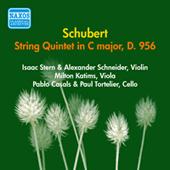 The
last time I heard the classic Stern-Schneider-Katims-Casals-Tortelier
version of Schubert�s String Quintet in C, D956 on
a Philips LP it sounded pretty dire. The Naxos transcription
starts discouragingly with bumps and rumbles and the sound is
fairly thin, even for 1956, but the emotion shines through in
this performance as in no other recording, including the Aeolian
Quartet and Chilingirian Quartet versions which I recommended
on budget-price reissues (Regis RRC1278 � see review
and Classics for Pleasure 2282822 � see review).
The Adagio is unbearably sublime in all three recordings,
but especially so on the Naxos. Your £1.99 will be money
well spent at classicsonline.com
� or £1.62 from emusic.com,
but if you must have a more recent recording, both the Aeolian
and Chilingirian versions can be downloaded for £4.99
each from classicsonline.com.
The
last time I heard the classic Stern-Schneider-Katims-Casals-Tortelier
version of Schubert�s String Quintet in C, D956 on
a Philips LP it sounded pretty dire. The Naxos transcription
starts discouragingly with bumps and rumbles and the sound is
fairly thin, even for 1956, but the emotion shines through in
this performance as in no other recording, including the Aeolian
Quartet and Chilingirian Quartet versions which I recommended
on budget-price reissues (Regis RRC1278 � see review
and Classics for Pleasure 2282822 � see review).
The Adagio is unbearably sublime in all three recordings,
but especially so on the Naxos. Your £1.99 will be money
well spent at classicsonline.com
� or £1.62 from emusic.com,
but if you must have a more recent recording, both the Aeolian
and Chilingirian versions can be downloaded for £4.99
each from classicsonline.com.
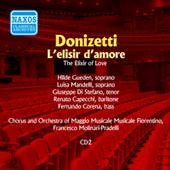 Donizetti�s
L’Elisir d’amore comes in a fine recording
from 1956 with Hilde Gueden, Giuseppe di Stefano, Fernando
Corena and the Maggio Musicale Orchestra conducted
by Francesco Molinari-Pradelli. The sound is dry but
acceptable and the fact that each act comes complete on one
track avoids the minor gaps between tracks that sometimes bedevil
mp3. (9.80008/9
� also available for a mere £0.84 from emusic.com.)
Either way, it�s less expensive than the Decca Heritage Masters
2-CD set (478 1724).
Donizetti�s
L’Elisir d’amore comes in a fine recording
from 1956 with Hilde Gueden, Giuseppe di Stefano, Fernando
Corena and the Maggio Musicale Orchestra conducted
by Francesco Molinari-Pradelli. The sound is dry but
acceptable and the fact that each act comes complete on one
track avoids the minor gaps between tracks that sometimes bedevil
mp3. (9.80008/9
� also available for a mere £0.84 from emusic.com.)
Either way, it�s less expensive than the Decca Heritage Masters
2-CD set (478 1724).
Donizetti isn’t my normal cup of tea but I was won over
by the exuberance of this performance.
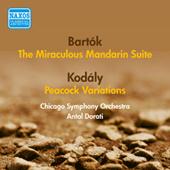
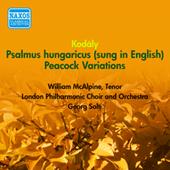 There
are not too many recordings of Kodály�s Peacock
Variations even now, so the Georg Solti recording
with the LPO from 1954, coupled with an impassioned and
powerful Psalmus Hungaricus (in English) is well
worth having. (9.80303,
or £0.84 from emusic.com.) Alternatively, there�s Antal
Doráti�s Chicago SO version, also from 1954, this
time coupled with Bartók�s Miraculous Mandarin
Suite (9.80115 or £0.84 from
emusic.com). What an age of bargains we live in when these
recordings can be had for a fraction of their original cost;
they were each first released on LP for £1/6/5 � at least
£40 in today�s values. Both recordings have worn well
in these Naxos transcriptions.
There
are not too many recordings of Kodály�s Peacock
Variations even now, so the Georg Solti recording
with the LPO from 1954, coupled with an impassioned and
powerful Psalmus Hungaricus (in English) is well
worth having. (9.80303,
or £0.84 from emusic.com.) Alternatively, there�s Antal
Doráti�s Chicago SO version, also from 1954, this
time coupled with Bartók�s Miraculous Mandarin
Suite (9.80115 or £0.84 from
emusic.com). What an age of bargains we live in when these
recordings can be had for a fraction of their original cost;
they were each first released on LP for £1/6/5 � at least
£40 in today�s values. Both recordings have worn well
in these Naxos transcriptions.
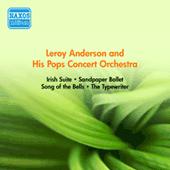 Leroy
Anderson�s own recordings of his music with his Pops Orchestra
on 9.80764,
recorded 1952-54, are preferable to Naxos�s own more recent
releases � you can actually hear the unconventional soloists
in the Sandpaper Ballet and the Typewriter � the
latter is almost inaudible on the otherwise recommendable Slatkin
recording (Naxos 8.559357). The otherwise idiomatic Paul
Mann recording on ABC Classics ABC476 1589 - see review
� relegates the typewriter even more to the background. The
Naxos Classical Archive recording also contains the Irish
Suite and Song of the Bells.
Leroy
Anderson�s own recordings of his music with his Pops Orchestra
on 9.80764,
recorded 1952-54, are preferable to Naxos�s own more recent
releases � you can actually hear the unconventional soloists
in the Sandpaper Ballet and the Typewriter � the
latter is almost inaudible on the otherwise recommendable Slatkin
recording (Naxos 8.559357). The otherwise idiomatic Paul
Mann recording on ABC Classics ABC476 1589 - see review
� relegates the typewriter even more to the background. The
Naxos Classical Archive recording also contains the Irish
Suite and Song of the Bells.
Currently 823 Naxos Classical Archive recordings are listed
� here
� why not browse them yourself? Happy hunting.
***
Josquin DESPREZ (c.1440-1521)
Ave Maria [6:17]
Missa Ave maris stella: Kyrie [2:42] Gloria [4:40]
Virgo prudentissima a 4 [2:28]
Virgo salutiferi genitrix [7:33]
Missa Ave maris stella: Credo [6:50]
Alma redemptoris mater � Ave regina cælorum [6:23]
Illibata Dei virgo nutrix � La re mi a 5 [6:57]
Missa Ave maris stella: Sanctus [7:20]
Benedicta es, cælorum regina [6:20]
Missa Ave maris stella: Agnus Dei [4:09]
Salve regina [6:27]
Bremen Weser Renaissance/Manfred Cordes
Texts not included.
CPO 777590-2 [68:06] � from classicsonline.com
(mp3) or stream from Naxos Music Library
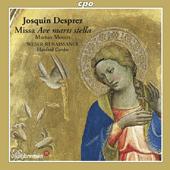 This
recording has some formidable competition to face on a recent
release from the Tallis Scholars (Gimell CDGIM044
� see review,
review
and November 2011/1 Roundup:
Download of the Month). Both are excellent, with
the Scholars adopting a slightly more measured pace, but in
a sense they are not in direct competition as the Gimell recording
offers just the movements of this and another Marian Mass, Missa
de beata Virgine, while the CPO intersperses other music
in honour of the Virgin Mary between the movements of the Mass
itself. Not that Cordes and his team try to reproduce any kind
of liturgical reconstruction, but some will prefer to have the
music presented in this way.
This
recording has some formidable competition to face on a recent
release from the Tallis Scholars (Gimell CDGIM044
� see review,
review
and November 2011/1 Roundup:
Download of the Month). Both are excellent, with
the Scholars adopting a slightly more measured pace, but in
a sense they are not in direct competition as the Gimell recording
offers just the movements of this and another Marian Mass, Missa
de beata Virgine, while the CPO intersperses other music
in honour of the Virgin Mary between the movements of the Mass
itself. Not that Cordes and his team try to reproduce any kind
of liturgical reconstruction, but some will prefer to have the
music presented in this way.
Those with access to the Naxos Music Library can compare the
two recordings there and judge for themselves how invidious
it would be to prefer one above the other. The deciding factor
may be that the download from Gimell runs for 76 minutes, comes
with the booklet of notes and texts and is available in mp3
and 16- and 24-bit lossless formats from £7.99 to £19.99.
John MERBECKE (c.1505/10-1585)
Domine Ihesu Christe [12:59]
Antiphon: per arma iustitie (plainsong) [0:35]
Missa per arma iustitie [36:51]
A virgin and mother [2:38]
Ave Dei patris filia [13:33]
The Cardinall�s Musick/Andrew Carwood; David Skinner � rec.
1995? DDD.
ASV CDGAU148 [66:37] � from hmvdigital.com
or amazon.co.uk (both mp3)
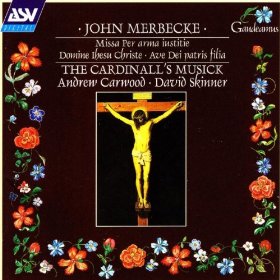 Anglicans
of a certain age will recall Merbecke�s unadventurous modified-plainsong
setting of Holy Communion which used to be well-nigh universal.
Don’t be put off by the memory � his earlier Latin settings
are in a completely different league, worthy to be mentioned
alongside his contemporaries Sheppard and Taverner. The performances
by the Cardinall�s Musick are self-recommending and the recording
sounds fine in the hmvdigital.com 320k download. All that is
missing is the texts and those of the ordinary of the Mass,
as employed in the major work here, are readily available. Like
many English settings of the time, the Kyries are not
included.
Anglicans
of a certain age will recall Merbecke�s unadventurous modified-plainsong
setting of Holy Communion which used to be well-nigh universal.
Don’t be put off by the memory � his earlier Latin settings
are in a completely different league, worthy to be mentioned
alongside his contemporaries Sheppard and Taverner. The performances
by the Cardinall�s Musick are self-recommending and the recording
sounds fine in the hmvdigital.com 320k download. All that is
missing is the texts and those of the ordinary of the Mass,
as employed in the major work here, are readily available. Like
many English settings of the time, the Kyries are not
included.
The academically curious will, in fact, find the complete pre-reformation
Sarum Missal online from Google Books here
and the Sarum Breviary here.
per arma justitiæ (the more conventional spelling),
is the antiphon at Terce on the first Sunday of Lent: per
arma justitiæ virtutis Dei, commendemus nosmetipsos in
multa patientia. [By the armour of righteousness by the
power of God, let us commit ourselves to much patience. Text
derived from 2 Corinthians 6, the Epistle for Lent I.] Scores
of some the music on the CD are available from cpdl.org � here;
it looks as if they intend to add the other works at some future
time.
The parent CD is not currently available; like most of The Cardinall�s
Musick�s recordings for ASV it languishes in undeserved limbo.
Some retailers have stocks of some of their CDs, but not, apparently,
the Merbecke � not surprisingly used copies are offered online
for £54, so the £7.49 download is good value. Both
amazon.co.uk and hmvdigital.com offer it at that price, but
the HMV download is preferable since it�s at 320kb/s. I’m
pleased to see that ASV have recently restored some of The Cardinall�s
Musick�s Byrd, absent for too long from the catalogue. I hope
that the Merbecke and many others will follow.
Merbecke�s setting of the Funeral Sentences is included on another
ASV album, Music at All Souls � The Lancastrians to The Tudors
(ASV CDGAU196) which I reviewed in the April 2011/1 Roundup.
The lossless download from passionato.com is no longer available
but hmvdigital.com have it in mp3 for £7.49. They also
have The Cardinall�s Musick recording of Byrd�s Music for Holy
Week and Easter � here
� again no longer available from passionato.com: see November
2010 Roundup.
Above all, don’t overlook the Hyperion recordings of Byrd,
made after they had taken over the series from ASV:
• Volume
10: Laudibus in sanctis CDA67568 � see review
and review
• Volume
11: Hodie Simon Petrus CDA67653 � see review
and January 2010 Roundup
• Volume
12: Assumpta est Maria CDA67675 � see Hyperion
Top 30
• Volume
13: Infelix ego CDA67779 � Recording of
the Month and Download of the Month: see
review
and February 2010 Roundup
William BYRD (1539/40-1623)
Ego sum panis vivus [2:32]
Mass for five voices with Propers for the Feast of Corpus Christi
[47:33]
Ab ortu solis [6:16]
Alleluia. Cognoverunt discipuli [4:13]
O sacrum convivium [3:55]
O salutaris hostia a 4 [3:41]
Ave verum corpus [4:33]
Winchester Cathedral Choir/David Hill � rec.1995. DDD.
Pdf booklet with texts and translations included.
HYPERION CDH55348 [72:46] � from hyperion-records.co.uk
(mp3 and lossless)
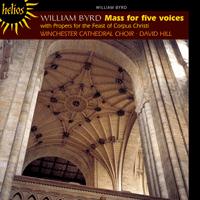 There
are more than enough fine recordings of Byrd�s Five-part Mass,
with or without the propers for a particular feast. This Hyperion
recording comes into semi-direct competition with the Nimbus
recording of Christ Church Choir and Stephen Darlington (NI5237
� see my joint review
with the 3- and 4-part Masses). Having coupled his version of
the Four-part Mass with the propers for Corpus Christi (NI5287),
Darlington interspersed his recording of the five-part work
with those of All Saints Day, so although the concept is the
same, the outcome is different.
There
are more than enough fine recordings of Byrd�s Five-part Mass,
with or without the propers for a particular feast. This Hyperion
recording comes into semi-direct competition with the Nimbus
recording of Christ Church Choir and Stephen Darlington (NI5237
� see my joint review
with the 3- and 4-part Masses). Having coupled his version of
the Four-part Mass with the propers for Corpus Christi (NI5287),
Darlington interspersed his recording of the five-part work
with those of All Saints Day, so although the concept is the
same, the outcome is different.
I enjoyed the Christ Church recordings, though acknowledging
that the choristers don’t make a special attempt to get
into the style that Byrd would have heard in a private recusant
home such as Ingatestone where Byrd was based towards the end
of his life. The Winchester performance does sound somewhat
less Anglican cathedral, especially as care was taken to make
the recording in a small side chapel and it includes more music
appropriate to Corpus Christi than the Christ Church version
of the four-part work. In fact, there�s more music for your
money on Hyperion, especially as it�s now reissued at budget
price, than on any of the Nimbus recordings, which all offer
rather short value.
The Christ Church recordings have been reissued on the budget
Regis label � just the masses without any of the propers on
RRC1336. That was a Bargain of the Month
in CD form � see my review
� and it�s no less welcome as an inexpensive download from classicsonline.com,
complete with booklet. You could have that Regis recording on
CD or download plus the Hyperion reissue and still not have
to lay out much more than £10. Whichever version you choose
� or, indeed, the excellent Tallis Scholars on Gimell, again
all the masses without any propers, on one half of a budget
2-CD set with The Great Service, CDGIM208
� Byrd�s masses contain music I could listen to till the proverbial
cows come home.
Anthony HOLBORNE (c.1545-1602) Pavan and Galliard
Julian Bream (lute)
BEULAH 3BX184 [6:09] � from eavb.co.uk
(mp3)
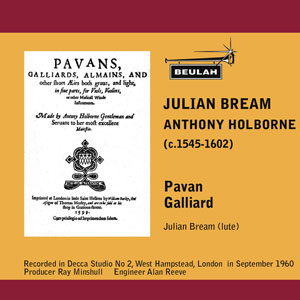 This
is another item from Julian Bream�s collection of renaissance
lute music, no longer available on CD. As with the Cutting and
Johnson recordings which I recommended in the February 2012/2
Roundup, the performances are self-recommending and the recording
has transferred very well. A precious few volumes of the RCA
Bream Edition are still available on CD � snap them up while
you can.
This
is another item from Julian Bream�s collection of renaissance
lute music, no longer available on CD. As with the Cutting and
Johnson recordings which I recommended in the February 2012/2
Roundup, the performances are self-recommending and the recording
has transferred very well. A precious few volumes of the RCA
Bream Edition are still available on CD � snap them up while
you can.
Thomas SELLE (1599 � 1663)
Die Auferstehung Christi � Historia, Sacred Concertos
and Motets for Easter
A Domino factum est illud à 14 [4:55]
Christ lag in Todesbanden à 4 [8:13]
Historia der Aufersehung à 14 [34:25]
Surrexit Christus spes mea à 12 [7:26]
Christ ist erstanden à 4 [04:25]
Jesus Christus, unser Heiland à 9 [6:30]
Erstanden ist der Herre Christ à 4 [2:17]
Ich weiß, dass mein Erlöser lebt à 8
[3:21]
Weser-Renaissance Bremen/Manfred Cordes � rec. live, 2008. DDD
CPO 777 396-2 [72:14] � from classicsonline.com
(mp3) or stream from Naxos Music Library.
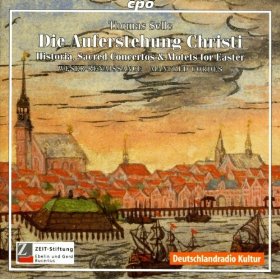 [‘This
disc bears witness to the quality of Selle�s sacred music and
gives some idea about the level of music-making in Hamburg in
the 17th century. Let�s hope more of this repertoire is going
to be explored.’ See review
by Johan van Veen.]
[‘This
disc bears witness to the quality of Selle�s sacred music and
gives some idea about the level of music-making in Hamburg in
the 17th century. Let�s hope more of this repertoire is going
to be explored.’ See review
by Johan van Veen.]
There are no texts, though that of the Resurrection Historia
is the same as that employed by Schütz, which is easier
to come by � for example in the booklet
which comes with the DaCapo download of the Schütz from
classicsonline.com or Naxos Music Library. Otherwise, at £4.99
this is a real bargain � amazon.co.uk are asking £7.49
for a download which presumably comes at only 256kb/s. theclassicalshop.net
offer a lossless version for £9.99, but again with no
text.
André CAMPRA (1660-1744)
Motets
In Domino gaudebo [6:21]
Florete prata, frondete lilia [8:50]
Exurge Domine [7:29]
O sacrum convivium [4:54]
O Jesu amantissime [10:54]
Ecce quam bonum [3:56]
Laudate Dominum de cælis [8:10]
Omnes gentes plaudite manibus [6:52]
Insere Domine [7:43]
Laudate Dominum in sanctis ejus [3:35]
Dissipa, Domine [6:48]
Philippa Hyde (soprano); Rodrigo del Pozo (haut-contre); Peter
Harvey (bass)
Canzona/Theresa Caudle
ET’CETERA KTC1201 [75:32] � from emusic.com
(mp3)
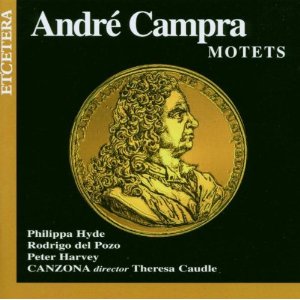 With
so much fine music from his contemporaries, it�s not surprising
that Campra has been somewhat neglected � no entry in the last
complete Penguin Guide or the 2012 Gramophone Guide � but it
is a shame. These fine performances of eleven of his motets,
at least one of which was a world premiere, ought to go some
way towards redressing the balance.
With
so much fine music from his contemporaries, it�s not surprising
that Campra has been somewhat neglected � no entry in the last
complete Penguin Guide or the 2012 Gramophone Guide � but it
is a shame. These fine performances of eleven of his motets,
at least one of which was a world premiere, ought to go some
way towards redressing the balance.
The download is good value at £4.62; alternatively, amazon.co.uk
have it for £4.99, presumably at 256kb/s, which is a little
higher than the emusic.com bit-rate of around 192kb/s, though
the latter is more than adequate. The price to be paid in both
cases is the lack of texts, though some of these are not too
hard to find on the web � type the opening words into your search
engine. There are scores of Campra�s motets online at imslp.org.
There�s an excellent budget 2-CD set of motets by Campra (very
little overlap with the Et’cetera programme) and Couperin,
on Virgin 5099969320651 � download from classicsonline.com:
see review.
I reviewed the Campra on a single disc in the May 2009 Roundup
and mentioned a dropout on track 2 of the Campra; fortunately
the Naxos Music Library version is free from this blemish, so
you should be able to buy its classicsonline.com equivalent
with confidence. If you have the older version with the faulty
track, the simplest thing to do is to purchase the track on
its own, in which case the most economical source is hmvdigital.com
at £0.99 � I did and the dropout has disappeared but there
are now some tiny clicks in places.
For Campra in a very different, festive mood try Hervé
Niquet and le Concert Spirituel in his opera-ballet le Carnaval
de Venise (Glossa GCD921622, two CDs, download from classicsonline.com
or stream from Naxos Music Library; both offer the pdf booklet
with texts and translations).
François COUPERIN ‘le Grand’
(1668-1733)
Leçons de Ténèbres pour le Mercredi
Saint (Tenebræ for Wednesday in Holy Week) (1713-1717):
Première Leçon [15:29]
Deuxième Leçon [11:41]
Troisième Leçon [11:35]
4 Versets du Motet: Tabescere me fecit [1:27]; Ignitum
eloquium [2:26]; Adolescentius sum ego [2:51]; Justitia
tua [2:01]
Sophie Daneman (soprano); Patricia Petibon (soprano)
Les Arts Florissants/William Christie � rec. 1996. DDD.
ERATO 0630170672 [47:32] - from amazon.co.uk
(mp3)
Laetentur Coeli Motet de St Barthélémy [6:47]
Venite Exultemus Domino [5:06]
Trois Leçons de Ténèbres : Première
Leçon [15:41]
Deuxième Leçon [12:28]
Troisième Leçon [11:01]
Magnificat [11:27]
James Bowman (countertenor)
Michael Chance (countertenor)
Mark Caudle (viola da gamba)
Robert King (chamber organ) � rec. December 1990. DDD
Performing editions by Robert King
Pitch: A = 415Hz. Chamber organ prepared by Philip Ridley
Pdf booklet with texts and translations included
HYPERION CDA66474 [62:30] � from hyperion-records.co.uk
(mp3 and lossless). CD available only from Archive Service.
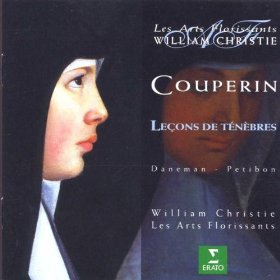
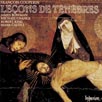 The
service of Tenebræ � no longer celebrated following
20th-century liturgical reforms � used to consist of the Matins
of Maundy Thursday, Good Friday and Holy Saturday celebrated
in anticipation the previous evening or even afternoon. Couperin,
for reasons which are unclear, seems to have set only the Maundy
Thursday texts, all from the Lamentations of Jeremiah, like
those of the other two days � hence the misleading appellation
pour le mercredy. For more details, please see my more
detailed review
of the Erato.
The
service of Tenebræ � no longer celebrated following
20th-century liturgical reforms � used to consist of the Matins
of Maundy Thursday, Good Friday and Holy Saturday celebrated
in anticipation the previous evening or even afternoon. Couperin,
for reasons which are unclear, seems to have set only the Maundy
Thursday texts, all from the Lamentations of Jeremiah, like
those of the other two days � hence the misleading appellation
pour le mercredy. For more details, please see my more
detailed review
of the Erato.
The Hyperion recording offers the three Tenebræ leçons
plus a motet for St Batholomew�s Day, the opening invitatory
of Matins, Venite, and a setting of the Vespers
canticle Magnificat. At 62:30 it scores over the Erato in terms
of length; both mp3 and lossless are available, and the download
comes with the texts and translations, which are not available
with the latter. These are, however, available to all comers
on the Hyperion web site, which evens out some of the advantage.
Both sets of performances are excellent, but I marginally prefer
the female voices on the Erato recording and the other advantage
is that you can obtain the download for just £2.79 from
amazon.co.uk,
albeit in only 256kb/s sound.
George Frideric HANDEL (1685-1759)
Musick for the Royal Fireworks [20:12]
Water Music [47:18]
The King�s Consort/Robert King � rec. 1989. DDD.
HYPERION HELIOS CDH55375 [67:30] � from hyperion-records.co.uk
(mp3 and lossless)
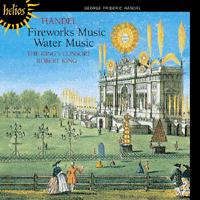 If
you’re looking forward to the grand jinks on the Thames
planned for the Queen�s Diamond Jubilee and don’t have
a recording of the Water Music, planned as part of the pageant,
this recording could well be what you’re looking for and
it comes with an equally recommendable Fireworks Music, all
at budget price. (See review
by Michael Greenhalgh.)
If
you’re looking forward to the grand jinks on the Thames
planned for the Queen�s Diamond Jubilee and don’t have
a recording of the Water Music, planned as part of the pageant,
this recording could well be what you’re looking for and
it comes with an equally recommendable Fireworks Music, all
at budget price. (See review
by Michael Greenhalgh.)
Alternatively there�s the Hervé Niquet recording which
I recommended in the April 2009 Roundup
(GCD921606)*, but the natural horns of the King�s Consort
are rather easier on the ear than those of le Concert Spirituel,
and the Hyperion download, in lossless as well as mp3, is less
expensive.
Even less expensively, hmvdigital.com have the DG Originals
reissue of the older Trevor Pinnock Archiv recording of Fireworks
and Water Music for just £4.99 � here
� and the 6-CD set of Handel orchestral works for £22.99
� here.
(See David Wright�s review
of an older reissue.)
The original Hyperion couplings remain available: Fireworks
with Coronation Anthems on CDA66350
and Water Music with Telemann�s Hamburg Wassermusik on
CDA66967.
To avoid duplication, the Telemann can be purchased separately
for £2.85.
* the CD version has been replaced by a hybrid SACD, GCD921616.
George Frideric HANDEL Theodora,
an Oratorio, HWV68 (1749)
Christina Wieland � Theodora (soprano)
Diana Schmid � Irene (mezzo)
Franz Vitzthum � Didymus (countertenor)
Knut Schoch � Septimius (tenor)
Klaus Mertens � Valens (bass-baritone)
Junge Kantorei
Frankfurt Baroque Orchestra/Joachim Carlos Martini
rec. live Basilika Kloster Eberbach, Eltville am Rhein, Germany,
23 May, 2010. DDD.
Pdf booklet with synopsis included.
NAXOS 8.572700-02 [3CDs: 2:51:54] � from classicsonline.com
(mp3) or stream from Naxos Music Library
Sung texts and German translation, can be accessed online �
here.
Heather Harper � Theodora (soprano)
Maureen Forrester � Didimus (alto)
Maureen Lehane � Irene (mezzo)
Alexander Young � Septimius (tenor)
John Lawrenson � Valens (bass-baritone)
Edgar Fleet � Messenger
Amor Artis Chorale
English Chamber Orchestra/Johannes Somary
Pdf booklet with text included
MUSICAL CONCEPTS ALTO ALC2005 [2 CDs] � from classicsonline.com
or hmvdigital.com
(both mp3) or stream from Naxos Music Library
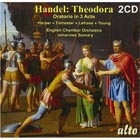
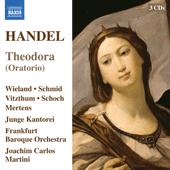 Theodora was not a great success when first performed
and it remains something of an orphan among Handel�s oratorios.
Like all of them, it has its moments of longueur but it also
has great beauties to equal the best of them.
Theodora was not a great success when first performed
and it remains something of an orphan among Handel�s oratorios.
Like all of them, it has its moments of longueur but it also
has great beauties to equal the best of them.
A few notes on economics first. The new Naxos recording spreads
to three CDs whereas the Alto, by dint of some small cuts fits
on two � by omitting repeats, the Overture to Act I is reduced
from 7:41 (Naxos) to 3:59 � thus making the comparative prices
from classicsonline.com £14.97 and £9.98. The Alto
download seems good value in comparison, but the CDs are available
from UK online suppliers for less than £9 � even better
value. There�s also a download from hmv.com for £7.99.
The classicsonline.com comes with the booklet, also available
from Naxos Music Library; the hmvdigital.com doesn’t.
The worst value, however, comes courtesy of emusic.com, whose
per-track charging policy delivers some amazing bargains, but
not in this case � almost £20 for the Alto and over £30
for the Naxos and for the Christie recording on Erato.
I bought the Somary when it first appeared on LP in the 1970s
alongside his recordings of Messiah and Judas Maccabæus
and again on CD at one of the intermittent times when Vanguard
recordings were available. He has an excellent rapport with
Handel � a kind of midway house between traditional and period
performances � and he was supported by a fine group of soloists.
I thought the Alto reissue of his recording of Semele
well worth considering (ALC2003 � see review)
and the same applies to this Theodora; both fit on two
CDs at the expense mainly of omission of repeats in da capo
arias. Both the Alto and Naxos recordings are good, with
the Naxos having the slight edge of more recent DDD sound.
The acid test of any performance of this work must be Theodora
herself and her aria O that I on wings could rise is
a real test piece. Heather Harper brings it off with aplomb
and fullness of tone at the end of the first CD. Christina Wieland
is lighter in tone on CD2 but you cannot really go wrong with
either � sample them both on the classicsonline.com web-page
or, better still, listen to the complete aria from Naxos Music
Library and safely make your own choice.
Another good place to make a comparison is the air Angels
ever bright and fair (Naxos CD1, tr.24, Alto CD1, tr.13).
Here again both soloists sound excellent, Wieland the lighter
more vulnerable sounding, Harper the more majestic martyr-to-be.
Wieland�s English is a little accented here � the a in
take me not quite idiomatic � but not a serious matter.
In both cases Alto band the recit and aria together,
Naxos separately.
Lorraine Hunt Lieberson as an encore to a Wigmore Hall recital
recording with piano accompaniment is so incomparable in this
air that one wishes that she might have recorded the whole work.
(WHlive024: Recording of the Month � see
review).
Sweet rose and lily (ActII/v) offers a good place to compare
singers of the role of Didymus. Franz Vitzthum (Naxos CD2, tr.19)
and David Daniels on a Virgin Classics album of Handel arias
(see review), as counter-tenors avoid the plumminess that sometimes
afflicts contraltos, though Vitzthum�s English is not quite
idiomatic. Maureen Forrester (Alto) cannot entirely avoid the
plumminess, especially in the recit which precedes the aria,
but the beauty of her singing in the air more than atones (CD2,
tr.4).
Both John Lawrenson and Klaus Mertens sing powerfully as Valens,
the latter with more idiomatic English than some of his compatriots.
Nor is there much to choose between the two singers of the role
of Septimius.
The Junge Kantorei sing well, too, though their timbre is a
little thicker than the more athletic-sounding Amor Artis Chorale.
Both orchestras play their parts well, though I have a slight
preference for the ECO on Alto. Though he abridges slightly,
where it�s possible to compare like for like Somary gives the
music a little more time to breathe and my choice overall remains
with this version by a small margin. If you don’t like
the small abridgements, however, the Naxos recording offers
a good alternative.
Johann Sebastian BACH (1685-1750)
Concertos with multiple instruments
Keyboard Concertos in d minor, BWV 1052, in A, BWV1055 [11:35],
in f minor, BWV1056 [9:06]
Concerto for two harpsichords in C, BWV1061 [16:54]
Concertos for three harpsichords in d minor, BWV1063 [12:44],
in C, BWV1064 [15:19]
Concerto for four harpsichords in a minor, BWV1065 (after Vivaldi,
Op.3/10) [8:41]
Brandenburg Concertos No.1 in F, BWV1046 [17:10], No.2 in F,
BWV1047 [11:16], No.3 in G, BWV1048 [9:29], No.4 in G, BWV1049
[14:18], No.5 in D, BWV1050 [19:57], No.6 in B-flat, BWV1051
[15:50]
Oboe d’amore Concertos in D, BWV1053 [17:53], in A, BWV1055
[12:42]
Violin Concertos in a minor, BWV1041 [13:45], in E, BWV1042
[15:30]
Concerto for two violins in d minor, BWV1043 [13:26]
Overtures (Suites) No.1 in C, BWV1066 [23:09], No.2 in b minor,
BWV1067 [22:55], No.3 in D, BWV1068 [20:43], No.4 in D, BWV1069
[21:42]
Concerto for oboe and violin in c minor, BWV1060 [11:58]
Concerto for recorder, violin and harpsichord in a minor, BWV1044
[19:04]
Café Zimmermann � rec. 2000-2010. DDD.
ALPHA ALPHA811 [6CDs: 6:16:13] � from classicsonline.com
(mp3) or stream from Naxos Music Library
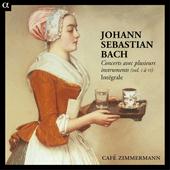 On
this 6-disc set, bringing together recordings made over a period
of ten years, there�s a wealth of illustrative material for
music lecturers to demonstrate Bach�s re-workings of his own
music and a treasure trove of enjoyment for the rest of us.
I reviewed Volume 5 in my August 2011/1 Download
Roundup. Though puzzled at the variety of works on offer
� more easily understood in the context of the complete set,
with a variety on each disc � I wrote �everything
here is well-nigh ideal: small-scale performances which nevertheless
convey all the power of the music, well recorded and available
in mp3 sound which does the recording justice. Now how did I
miss the four earlier volumes in this series?� Well,
now I’m happy to have caught up with them and everything
is of the same high standard � lively performances, though never
breakneck, and sounding well in best-quality mp3. Now, too,
I can see the logic of spreading the Brandenburgs over six discs,
the Suites over four.
On
this 6-disc set, bringing together recordings made over a period
of ten years, there�s a wealth of illustrative material for
music lecturers to demonstrate Bach�s re-workings of his own
music and a treasure trove of enjoyment for the rest of us.
I reviewed Volume 5 in my August 2011/1 Download
Roundup. Though puzzled at the variety of works on offer
� more easily understood in the context of the complete set,
with a variety on each disc � I wrote �everything
here is well-nigh ideal: small-scale performances which nevertheless
convey all the power of the music, well recorded and available
in mp3 sound which does the recording justice. Now how did I
miss the four earlier volumes in this series?� Well,
now I’m happy to have caught up with them and everything
is of the same high standard � lively performances, though never
breakneck, and sounding well in best-quality mp3. Now, too,
I can see the logic of spreading the Brandenburgs over six discs,
the Suites over four.
Only one work, BWV1055, appears here in both its published form
for keyboard and orchestra and its reconstruction for the oboe
d’amore, an instrument as beautiful as its name suggests.
To have included all the duplicate versions would have necessitated
at least one more disc, which would have been unrealistic. My
only other very illogical complaint is that we still have a
cosy domestic scene on the cover when the performances are anything
but over-delicate. The motto of this series is ut musica
pictura � the picture is like the music � but Bach�s music
is no more like a Meissen coffee cup than Mozart�s.
At around £45 in the UK the 6-CD* represents a saving
over buying the individual discs; at £18.99 the classicsonline.com
download brings a considerable further reduction � less than
other amazon.co.uk and hmvdigital.com are asking. Though it
comes without the booklet of notes, you’ll have enough
left over to buy one of the many inexpensive introductory books
on Bach, such as Malcolm Boyd�s (third edition, 2000) in the
OUP Master Musicians series or Nicholas Kenyon�s recent Pocket
Guide (Faber, 2011). Those with access to the Naxos Music Library
will find the booklets for volumes 5 and 6 there. If you don’t
feel able to commit to the whole series at one, the individual
volumes are just £4.99 from classicsonline.com.
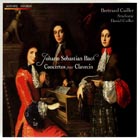
If you would like to add the solo keyboard concerto BWV1058,
subscribers to emusic.com will find this as part of a most recommendable
Mirare recording of BWV1052, 1055, 1056 and 1058. If you want
just the one concerto, you can download it for £0.42 per
track � £1.26 per concerto. (MIR085, Bertrand Cuiller
(harpsichord) and the Stradivaria Ensemble/Daniel Cuiller �
download here).
Alternatively it�s £0.79 per track from hmvdigital.com
but at a higher bit-rate of 320kb/s.
* currently on offer for around £38 from some suppliers.
Johann Sebastian BACH Brandenburg
Concerto No.5 in D
New York Sinfonietta/Max Goberman
BEULAH 17-20BX112 [22:27] � from eavb.co.uk
(mp3)
Brandenburg Concerto No.6 in B-flat
New York Sinfonietta/Max Goberman
BEULAH 21-23BX112 [18:07] � from eavb.co.uk
(mp3)
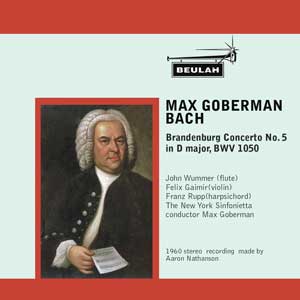
These two sets of tracks complete the reissues of the ground-breaking
performances which Beulah have been making over the last few
months. I reviewed the complete set on 12PD42 in my previous
Roundup, so I need only add that these two final instalments
are well up to the high standard exhibited by their predecessors.
If you want the complete set, as I’m sure you will � there�s
very little allowance to be made for the age of the recordings
� the iTunes download is probably the better bet.
Joseph HAYDN (1732-1809)
Overture lo Speziale
Vienna State Opera Orchestra/Max Goberman � rec.1959 ADD/stereo
BEULAH 41BX112 [6:59] � from eavb.co.uk
(mp3)
Symphony No.6 in D (‘le Matin’)
Vienna State Opera Orchestra/Max Goberman � rec.1959 ADD/stereo
BEULAH 24-27BX112 [20:04 ]- from eavb.co.uk
(mp3)
Symphony No.13 in D
Vienna State Opera Orchestra/Max Goberman � rec.1959 ADD/stereo
BEULAH 28-31BX112 [17:38] � from eavb.co.uk
(mp3)
Symphony No.45 in f -sharp minor (‘Farewell’)
Aldeburgh Festival Orchestra/Benjamin Britten � rec. 1956. ADD/mono
BEULAH 5-8BX185 [24:10] � from eavb.co.uk
(mp3)
Symphony No.55 in E-flat (‘Schoolmaster’)
Aldeburgh Festival Orchestra/Benjamin Britten � rec. 1956. ADD/mono
BEULAH 1-4BX185 [21:49] � from eavb.co.uk
(mp3)
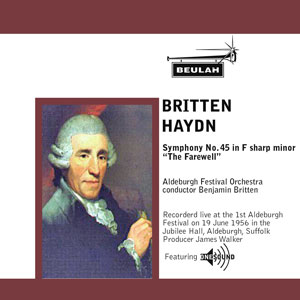
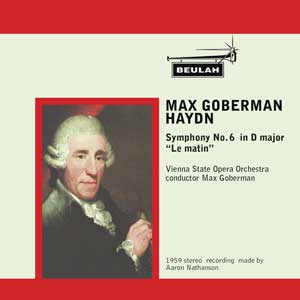 Beulah
are on a Haydn roll this month; in addition to the Beecham recordings
of two of the later London symphonies (see above) we have these
classic recordings from Britten and Goberman.
Beulah
are on a Haydn roll this month; in addition to the Beecham recordings
of two of the later London symphonies (see above) we have these
classic recordings from Britten and Goberman.
The Britten recordings were made live at the Aldeburgh
Festival by Decca engineers in 1956 and reissued on a set of
his Haydn and Mozart in 2000, which I think is no longer available,
so the Beulah release is very welcome. He throws himself into
the Sturm und Drang opening of No.45 in energetic style.
Indeed, there�s little or nothing in either performance that
doesn’t still sound stylish � just a little more rubato
than we might expect now� and the recordings still sound well,
with more bloom than you would expect for their age and a mercifully
almost silent audience. Despite having a nickname, No.55 is
rather less well known than 45, but no less attractive.
The Goberman version of le Matin appeared in 1969
on CBS Classics (Odyssey in the US), in company with Nos. 4
and 5, part of a planned series of ground-breaking recordings
for the Library of Recorded Masterpieces using HC Robbins-Landon�s
edition, but sadly one which had been interrupted by Goberman�s
death in 1962. CBS never even got as far as issuing what had
been completed and to the best of my knowledge the Beulah reissues
have no current competition. The performance is a little larger
in scale than we are used to nowadays, despite the (barely audible)
harpsichord but eminently stylish. The VSOO were never the world�s
greatest but they play very well here and the recording is very
much more than adequate.
The symphonies are obviously more substantial works than the
Overture lo Speziale, but that�s performed stylishly,
too.
Franz SCHUBERT (1797-1828)
The Hyperion Schubert Lieder Edition: Volume 4: Schubert
and his Friends II.
Der Liedler D209 [15:20]
Sängers Morgenlied D163 [2:23]
Sängers Morgenlied D165 [3:38]
Das war ich D174 [3:08]
Liebeständelei D206 [2:00]
Liebesrausch D179 [3:06]
Sehnsucht der Liebe D180 [4:56]
Das gestörte Glück D309 [2:20]
Auf der Riesenkoppe D611 [4:17]
Am See D124 [5:03]
Alte Liebe rostet nie D477 [2:56]
Am Strome D539 [2:25]
Nachtstück D672 [5:46]
Liebeslauschen ‘Des Fräuleins Liebeslausche’
D698 [4:52]
Epistel ‘An Herrn Josef von Spaun, Assessor in Linz’
‘Musikalischer Schwank’ D749 [4:46]
Philip Langridge (tenor); Graham Johnson (piano) � rec. 1983.
DDD.
Pdf booklet with texts included
HYPERION CDJ33004 [66:56] � CD available only from Archive
Service. Download from
hyperion-records.co.uk (mp3 and lossless)
Volume 6: Schubert and the Nocturne I
Die Nacht D534 [13:26]
Jagdlied D521 [1:34]
Abendstern D806 [2:45]
Abends unter der Linde D235 [2:41]
Abends unter der Linde D237 [4:37]
Der Knabe in der Wiege ‘Wiegenlied’ D579 [3:50]
Abendlied für die Entfernte D856 [8:23]
Willkommen und Abschied D767, First version: Es schlug
mein Herz, geschwind zu Pferde! [3:31]
Vor meiner Wiege D927 [5:31]
Der Vater mit dem Kind D906 [4:34]
Des Fischers Liebesglück D933 [7:19]
Die Sterne D939 [3:30]
Alinde D904 [4:44]
An die Laute D905 [1:35]
Zur guten Nacht D903 [3:52]
Anthony Rolfe Johnson (tenor); Graham Johnson (piano) � rec.
1989. DDD.
Pdf booklet with texts and translations included
HYPERION CDJ33006 [71:52] � CD available only from Archive
Service. Download from hyperion-records.co.uk
(mp3 and lossless)
Volume 37: The Final Year
Auf dem Strom D943 (Rellstab)*** [9:18]
Herbst D945 (Rellstab) * [3:21]
Bei dir allein! D866 No 2 (Seidl) * [2:14]
Irdisches Glück D866 No 4 (Seidl) *** [4:10]
Lebensmut D937 (Rellstab) *** [1:58]
Schwanengesang D957 Part 1 (Rellstab)
No 1: Liebesbotschaft * [2:55]
No 2: Kriegers Ahnung * [5:16]
No 3: Frühlingssehnsucht * [3:53]
No 4: Ständchen * [4:03]
No 5: Aufenthalt * [3:35]
No 6: In der Ferne * [6:04]
No 7: Abschied * [4:48]
Glaube, Hoffnung und Liebe D955 (Kuffner)*/**/*** [4:59]
Schwanengesang D957 Part 2 (Heine)
No 8: Der Atlas ** [2:13]
No 9: Ihr Bild ** [2:53]
No 10: Das Fischermädchen ** [2:27]
No 11: Die Stadt ** [2:51]
No 12: Am Meer ** [3:56]
No 13: Der Doppelgänger ** [3:41]
Die Taubenpost D965a (formerly D957 No 14) (Seidl) **
[3:34]
John Mark Ainsley*, Anthony Rolfe Johnson**, Michael Schade***
(tenors)
Graham Johnson (piano)
David Pyatt (French horn) � rec. 2000. DDD.
Pdf booklet with texts and translations included
CDJ33037 [79:18] � from hyperion-records.co.uk
(mp3 or lossless)
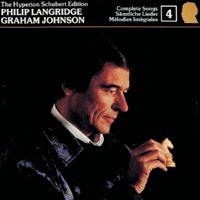
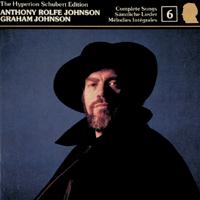
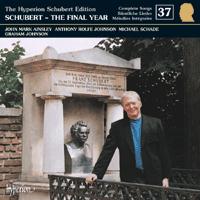 Comparing
lieder from these three volumes with the EMI Digital Debut recording
(above) has served as a reminder that I started to review this
series some time ago but failed to follow up. BBC Radio 3�s
survey of Schubert�s music at the end of March 2012 has served
as an additional reminder of the high quality of his lieder
settings and the extent to which they dominate his output �
in marked opposition to his teacher Salieri�s advice to shun
the German song for Italian texts.
Comparing
lieder from these three volumes with the EMI Digital Debut recording
(above) has served as a reminder that I started to review this
series some time ago but failed to follow up. BBC Radio 3�s
survey of Schubert�s music at the end of March 2012 has served
as an additional reminder of the high quality of his lieder
settings and the extent to which they dominate his output �
in marked opposition to his teacher Salieri�s advice to shun
the German song for Italian texts.
I won’t repeat the details of the comparisons which I made
with the EMI debut recordings, except to summarise that I enjoyed
Paul Appleby�s début but found the more experienced Hyperion
singers a shade more ‘into’ the music and, especially
in the case of Anthony Rolfe Johnson, their diction is much
clearer � so clear as almost to make the libretto unnecessary.
Graham Johnson�s expertise as accompanist can also be taken
as read � he�s the Gerald Moore de nos jours and it�s
more than appropriate that the J in the catalogue numbers should
presumably derive from the initial of his surname. The qualities
which I’ve outlined in those lieder which I compared with
the new recordings are equally to be found in the complete contents
of the three albums; all can be recommended without reservation.
Two of these volumes are deleted on CD but available from the
Archive Service or as downloads. If it seems odd that two releases
from such a superlative series should appear to have fallen
from grace, it�s doubtless due to the existence of a complete
boxed set at an attractive price (CDS44201/40
on CD for £180 or as downloads for £130. See
review.)
Once you’ve dipped into any one of the albums, the attractions
of the complete set may be irresistible. At the other end of
the scale, if you just want to sample the delights of the earliest
volumes in the series, there�s a sampler for £2.99, deleted
on CD but available as a download. (HYP200).
Modest MUSSORGSKY (1839-1881)
Boris Godunov (ed. RIMSKY-KORSAKOV)
Boris, Pimen, Varlaam � Boris Christoff (bass)
Grigory � Nicolai Gedda (tenor)
Marina, Feodor � Eugenia Zareska (mezzo)
Shuisky, Missail, Krushchov � Andre Bielecki (tenor)
Rangoni, Shchelkalov � Kim Borg (bass)
Xenia � Ludmila Lebedeva (soprano)
Nurse, Hostess � Lydia Romanova (mezzo)
Simpleton � Wassili Pasternak (tenor)
Lavitsky � Raymond Bonte (tenor)
Chernikovsky � Eugene Bousquet (bass)
Choeurs Russes de Paris
French Radio National Orchestra/Issay Dobrowen � rec 1952. ADD/mono
PAST CLASSICS [177:21] � from emusic.com
(mp3)
Boris Godunov: Highlights in English (based on the initial
version of 1869)
English translation by David Lloyd-Jones
Coronation Scene [8:04]
Varlaam�s Song [2:30]
Apartments Scene [27:59]
St Basil Scene [11:16]
Death Scene [24:20]
Prince Shuisky � Stuart Kale (tenor)
Boris, Tsar of Russia � John Tomlinson (bass)
Varlaam, a vagabond monk � Clive Bayley (bass)
Xenia, Boris�s daughter � Joan Rodgers (soprano)
Feodor, Tsarevich � Susan Parry (mezzo)
The old Nurse � Yvonne Howard (mezzo)
Simpleton � Mark Curtis (tenor)
Pimen, monk and chronicler � Matthew Best (bass)
Shchelkalov � Stephen Dawson (baritone)
Chorus of Opera North/Martin Fitzpatrick (chorus master)
Choristers of Leeds Parish Church/Simon Lindley (chorus master)
English Northern Philharmonia/Paul Daniel � rec. 1997. DDD.
Pdf booklet with text available
CHANDOS CHAN3007 [74:43] � from theclassicalshop.net
(mp3 and lossless)
Both of these downloads are very good value: the classic Dobrowen
recording is complete on five tracks for £2.10; the mp3
version of the Chandos highlights album is good value at £6.00
but the lossless version is worth the £4.00 extra.
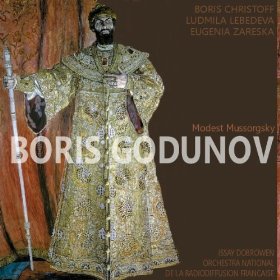 Of
the Naxos Historical reissue of the Christoff-Dobrowen
recording (8.110242/4), Colin Clarke wrote ‘A massively
impressive release’ � see review
� and Robert J Farr had ‘no hesitation in recommending
this restoration of a seminal performance’ � see review.
Their superlatives are fully justified. That Naxos reissue is
good value as a download from classicsonline.com at £14.97
� it contains some interesting appendices and it comes in 320kb/s
mp3 as opposed to the miserly 154kb/s of the emusic.com version
� but, surprisingly, the Past Classics download sounds almost
as good, despite the lower bit-rate. That low bit-rate, however,
means that you can burn the whole opera on one mp3 CD. In addition
to the Past Classics and Naxos Historical reissues of the 1952
version, Brilliant Boxes have it on 3 CDs for around £8
(93926).
Of
the Naxos Historical reissue of the Christoff-Dobrowen
recording (8.110242/4), Colin Clarke wrote ‘A massively
impressive release’ � see review
� and Robert J Farr had ‘no hesitation in recommending
this restoration of a seminal performance’ � see review.
Their superlatives are fully justified. That Naxos reissue is
good value as a download from classicsonline.com at £14.97
� it contains some interesting appendices and it comes in 320kb/s
mp3 as opposed to the miserly 154kb/s of the emusic.com version
� but, surprisingly, the Past Classics download sounds almost
as good, despite the lower bit-rate. That low bit-rate, however,
means that you can burn the whole opera on one mp3 CD. In addition
to the Past Classics and Naxos Historical reissues of the 1952
version, Brilliant Boxes have it on 3 CDs for around £8
(93926).
I first encountered Boris Godunov from Christoff�s stereo
remake for EMI Angel, courtesy of the University record library;
the earlier version has a power not entirely recaptured a few
years later under Cluytens, though Tony Haywood thought the
later version a worth Great Recording of the Century (see review:
download from classicsonline.com).
That recording seems not to be currently available, so the download
is the only way to obtain it until it reappears at a slightly
lower price on the EMI Opera series, as it surely must.
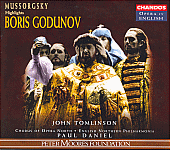 I’m
not normally a fan of excerpts but the Chandos recording
works very well. John Tomlinson�s Boris is different from Christoff�s
and he doesn’t attempt the same multiplicity of roles as
the latter but he�s excellent on his own terms, very well supported
and I enjoyed this recording. The sound, of course, is far superior
to the mono Past Classics, especially in the lossless version.
I’m
not normally a fan of excerpts but the Chandos recording
works very well. John Tomlinson�s Boris is different from Christoff�s
and he doesn’t attempt the same multiplicity of roles as
the latter but he�s excellent on his own terms, very well supported
and I enjoyed this recording. The sound, of course, is far superior
to the mono Past Classics, especially in the lossless version.
There are no notes with the Past Classics but synopses of the
work are not hard to come by online. There�s one in the booklet
for the Naxos Historical reissue, which is available to those
who subscribe to the Naxos Music Library. It doesn’t matter
that it�s keyed to the Naxos reissue, which has more tracks.
There�s also one with the Chandos which is available from their
web-site to all comers.
Richard STRAUSS (1864-1949)
Don Quixote, Variations on a Knightly Theme, Op.35 (1897)
* [41:07]
Till Eulenspiegels lustige Streiche, Op.28 (1894/5) **
[15:29]
Don Juan, Op. 20 (1888) ^ [16:23]
Paul Tortelier (cello) *
Berlin Philharmonic Orchestra/Rudolf Kempe */**; Fritz Lehmann
^ � rec. 1958 */**; first published 1958 (rec. 1954) ^
REGIS RRC1371 [73:37] � from classicsonline.com
(mp3) or stream from Naxos Music Library
[‘I would be perfectly happy if these accounts were the
only ones in my collection.’ See review
by Michael Cookson]
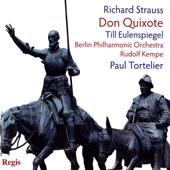 I
recommended a super-bargain version of these Kempe accounts
of Don Quixote and Till Eulenspiegel from Past
Classics, at £0.84 from emusic.com, in my August 2011/2
Roundup
but this Regis transfer costs only a little more, offers a better-quality
transfer of the recordings, includes the booklet of notes and
adds Lehmann�s fine account of Don Juan. If you haven’t
already bought the CD on MC�s recommendation or the Past Classics
download, what are you waiting for? The Kempe recordings could
almost have been made yesterday and the Lehmann is also pretty
good � inevitably a little more restricted than the Kempe but
not so as to spoil my enjoyment of an excellent reissue.
I
recommended a super-bargain version of these Kempe accounts
of Don Quixote and Till Eulenspiegel from Past
Classics, at £0.84 from emusic.com, in my August 2011/2
Roundup
but this Regis transfer costs only a little more, offers a better-quality
transfer of the recordings, includes the booklet of notes and
adds Lehmann�s fine account of Don Juan. If you haven’t
already bought the CD on MC�s recommendation or the Past Classics
download, what are you waiting for? The Kempe recordings could
almost have been made yesterday and the Lehmann is also pretty
good � inevitably a little more restricted than the Kempe but
not so as to spoil my enjoyment of an excellent reissue.
Just one small quibble � the end of Till is usually interpreted
as the ghost of the ‘hero’ mocking his executioners
� or, I suggest, inspired by the end of the Early New High German
original story in which Till�s shroud tears and his body stands
up in the grave � but Hugo Shirley in the Regis notes sees it
as Till escaping to carry on further exploits.
Kempe�s later Staatskapelle recording of Don Quixote,
again with Tortelier, together with Till Eulenspiegel and
Don Juan, have been reissued as part of a recent jumbo bargain
Brilliant Classics box (9249: see review
by Rob Barnett.)
Carl NIELSEN (1865-1931)
Symphony No.4, Op.29 (Inextinguishable) [36:13]
Symphony No.5, Op.50 [35:30]
Symphony No.6 (Sinfonia semplice) [34:00]
San Francisco Symphony Orchestra/Herbert Blomstedt
Little Suite in a minor, Op.1 [15:25]
Hymnus amoris, Op.12 (original version) * [20:11]
Barbara Bonney (soprano); John Mark Ainsley, Lars Pedersen (tenor);
Michael W Hansen, Bo Anker Hansen (baritone) *
Danish National Radio Choir and Orchestra/Ulf Schirmer
DOUBLE DECCA 460 9882 [71:43 + 69:37] � from hmvdigital.com
(mp3)
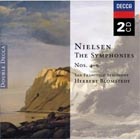 I’ve
seen this and its partner recording of Nos.1-3 (460 9852)
described as an outrageous online bargain, and I certainly can’t
quarrel with that. The performances remain just about the most
recommendable versions of the three symphonies, though I haven’t
yet heard Colin Davis�s new cycle with the LSO on their own
label and I’d put in a plea for Paavo Berglund�s late-80s
RCA recordings with the Royal Danish Orchestra � or would, except
that the 3-disc set seems no longer to be available in the UK,
on CD or as download. Someone is asking over £119 for
it on amazon.co.uk as I write � and I wouldn’t sell my
copy even at that price.
I’ve
seen this and its partner recording of Nos.1-3 (460 9852)
described as an outrageous online bargain, and I certainly can’t
quarrel with that. The performances remain just about the most
recommendable versions of the three symphonies, though I haven’t
yet heard Colin Davis�s new cycle with the LSO on their own
label and I’d put in a plea for Paavo Berglund�s late-80s
RCA recordings with the Royal Danish Orchestra � or would, except
that the 3-disc set seems no longer to be available in the UK,
on CD or as download. Someone is asking over £119 for
it on amazon.co.uk as I write � and I wouldn’t sell my
copy even at that price.
I used Berglund as my benchmark for Nos. 5 and 6 and there�s
very little to choose between him and Blomstedt � Berglund is
a little more urgent in No.6 and Blomstedt in No.5.
I originally downloaded this Decca double album from passionato.com,
but that�s now a fact of only historical significance, since
they no longer offer downloads. I haven’t heard the hmvdigital.com
version, but it comes in 320kb/s format, so it should be fine;
at £7.49 it�s less expensive than the version from deutschegrammophon.com
(£9.49 for mp3), though that�s currently the only show
in town if you want lossless flac (£11.49).
If you prefer Blomstedt�s earlier Danish recordings of all six
symphonies, hmvdigital.com can oblige with an even better bargain
� three CDs for £7.49 � here:
see review.
Sir Granville BANTOCK (1868-1946)
Pagan Symphony ‘Et ego in Arcadia vixi’ [35:45]
Fifine at the Fair [35:35]
Cuchullan�s Lament (Heroic Ballad No 1) [3:53]
Kishmul�s Galley (Heroic Ballad No 2) [4:26]
Royal Philharmonic Orchestra/Vernon Handley � rec. 1992. DDD.
Pdf booklet included
HYPERION CDA66630 [79:39] � from hyperion-records.co.uk
(mp3 and lossless)
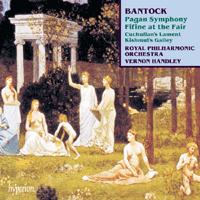 If
Fifine at the Fair is the only work by Granville Bantock
that you know, not only does it receive an excellent performance
here, but buying the recording for that work alone will also
bring you into contact with his powerful Pagan Symphony.
If
Fifine at the Fair is the only work by Granville Bantock
that you know, not only does it receive an excellent performance
here, but buying the recording for that work alone will also
bring you into contact with his powerful Pagan Symphony.
Vincent Budd thought this recording ‘essential listening,
and [an] excellent point from which to approach the music of
GB’ and I’m not about to demur. (MusicWeb International
Discography of Granville Bantock � here.)
When he wrote, there were three extant recordings, but this
seems to be the only one to have survived, so it�s good to be
able to report that all the music here is safe in the hands
of Vernon Handley, the RPO, the recording engineers and Hyperion�s
lossless transcription. The frontispiece, from a painting by
Puvis de Chavannes, sets off the music perfectly.
As an added incentive, the download of this recording was discounted
to £6.00 at the time of writing, which adds to its attractions.
It�s also available, on CD and as a download, as part of a specially-priced
6-disc set CDS44281/6.
Carl ORFF (1895-1982)
Carmina Burana (1935)
Gundula Janowitz (soprano)
Gerhard Stolze (tenor)
Dietrich Fischer-Dieskau (baritone)
Chor der Deutschen Oper Berlin
Schöneberger Sängerknaben
Chor und Orchester der Deutsche Oper Berlin/Eugen Jochum
rec. UFA-Tonstudio, Berlin, October 1967
UNI020 [56:00] � available from Linn
Records (mp3 and lossless)
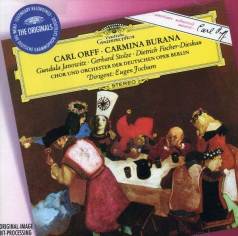 Like
it or loathe it, Carmina Burana is God�s gift to audiophiles;
with its pounding ostinati, battery of percussion and
racy lyrics it seldom fails to make an impact, either in the
concert hall or living room. Which is probably why this classic
DG recording and that spectacular Decca/Solti Mahler 8 � review
� are included in the first tranche of Universal�s high-resolution
downloads. Despite patches of compression/overload the Mahler
has never sounded better, so I had high hopes for this Orff
release, much-praised in its day and boasting a fine array of
soloists and choirs.
Like
it or loathe it, Carmina Burana is God�s gift to audiophiles;
with its pounding ostinati, battery of percussion and
racy lyrics it seldom fails to make an impact, either in the
concert hall or living room. Which is probably why this classic
DG recording and that spectacular Decca/Solti Mahler 8 � review
� are included in the first tranche of Universal�s high-resolution
downloads. Despite patches of compression/overload the Mahler
has never sounded better, so I had high hopes for this Orff
release, much-praised in its day and boasting a fine array of
soloists and choirs.
First, some general comments. Many performances I’ve encountered
� live and on record � bring out the audacity and exuberance
of this strange score, turning it into a rollicking, roustabout
of a piece. And why not, for it�s hard to take these tales of
medieval excess and bawdiness too seriously; indeed, most conductors
approach it with a metaphorical nudge and a wink to remind us
that yes, it�s tacky but it�s a lot of fun. And that�s the very
first thing one notices about Jochum�s performance; it�s dead
serious, even dead-pan. Not a hanging offence of course, but
it does create moments of uneasiness, where high art and low
comedy clash � to bizarre effect.
From those iconic invocations to the fickle moon � much used
by advertisers and on film soundtracks � it�s clear Jochum�s
a stickler for rhythmic precision, his assembled choirs singing
with the seriousness and focus one might expect of a Bruckner
Mass. There�s a complementary crispness to the playing that�s
very impressive, the score�s odd colours rendered with unusual
vividness and detail. Instrumental separation is startling too,
the bass drum, cymbals and assorted gongs emerging from the
mix with rare, unforced splendour. The only caveat is that there�s
a hint of sibilance to the choral singing at times � strings
are a little wiry as well � but in mitigation those huge dynamic
swings are superbly managed.
Indeed, this re-mastering is so fresh and clean � but not squeakily
so � that it�s hard to believe the tapes are nearly half-a-century
old; proof, if it were needed, that good recordings start with
good engineers � in this case Klaus Scheibe. The small choir
in ‘Primo vere’ has never sounded so lifelike, individual
voice so clearly distinguishable, and the ever-reliable Fischer-Dieskau
sings most feelingly of the sun�s benevolence in ‘Omnia
sol temperat’. Other conductors may find more zip and zing
in those big choral numbers � ‘Ecce gratum’ especially
� but Jochum�s steady, explicit way with this score yields unexpected
dividends. Just listen to the purely instrumental dance of ‘Uf
dem anger’ and you’ll hear it played with a marvellous
ear for poise and point.
Thinking back to other memorable recordings of Carmina Burana
� Previn, Muti, Mata and Blomstedt in particular � I remember
a lot more joy and spontaneity, but I can’t recall anything
like the degree of musical sophistication on show here. Indeed,
subtlety may not be the first word that springs to mind in this
most ribald context, but Jochum certainly finds it. Little wonder
that this recording bears the composer�s imprimatur, as it could
be argued that Jochum makes the music sound so much better than
it actually is.
Technically there is much to admire in this fine re-mastering;
the stereo spread is very believable, adding extra frisson
to the opposing choruses of ‘swaz hie gat umbe’ and
the towering, tinglesome close to Part I. The latter is despatched
with nary a hint of stress or strain, which is astonishing for
a recording of this vintage. And there�s more to delight the
ear in Part II, Fischer-Dieskau�s ‘Estuans interius� and
‘Ego sum abbas� sung with care and intelligence; which
is more than one can say for Gerhard Stolze�s buffoonery and
risible falsetto in ‘Olim lacus colueram’. This is
definitely one of the most uncomfortable episodes in this performance,
made more so by the relative restraint that surrounds it.
No such qualms about the various choirs, who sound simply glorious;
their rendition of ‘In taberna quando sumus� is so incisive
and rhythmically supple, the boys clear and characterful in
‘Amor volat undique’, at the start of Part III. As
for Gundula Janowitz as the young maiden she seems a little
strait-laced � perhaps even a tad awkward � alongside the exquisite
abandon of Barbara Hendricks for Mata, but she does sing most
beautifully. As for the rest, the double choir in ‘Veni,
veni, venias� it�s full of zest, although ‘Tempus est jocundum’
is a little bit rough at the edges; but Janowitz�s blood-curdling
‘Dulcissime’ � is she being ravished or murdered?
� is one of those moments where Jochum�s otherwise straight
reading becomes unintentionally bizarre. The closing chorus
is as thrilling as ever, though.
Sonically this Carmina Burana is astonishing, a perfect
example of just how good a properly recorded and re-mastered
performance can sound. That said, I’m not quite so enamoured
of the performance, and would hope that the excellent Previn
and Muti versions (both on EMI) and Mata�s (RCA) get the high-res
treatment too. I’m afraid I can’t recommend the Hickox
recording � review
� available as a download from theclassicalshop.net.. And on
that critical note, Universal�s decision not to provide liner-notes
strikes me as parsimonious, especially when these 24/96 flacs
are being sold for a whopping £18.
A promising start to Universal�s download programme. More �
lots more � please.
Dan Morgan
http://twitter.com/mahlerei
[See also my review of an mp3 download of this recording in
the August 2010 Roundup,
from which it�s apparent that I’m rather more positive
about Jochum and his team than Dan. The passionato.com link
no longer applies; for mp3 and 16- and 24-bit lossless the Linn
download now becomes the obvious place to go.
My other recommendation from about the same date, conducted
by Frühbeck de Burgos seems to be no longer available on
disc. Classicsonline.com and hmvdigital.com have the download
of the Encore reissue � at £7.99 both seem expensive when
the disc cost rather less, but it�s currently a case of take
it or leave it unless you can find a remainder of the Encore,
preferably the US version with the Recording Angel rather than
Nipper on the front. BW.]
Erich Wolfgang KORNGOLD (1897-1957)
Quintet in E, Op.15, for two violins, viola, cello, and piano
(1921-22)* [32:24]
Sextet in D, Op.10, for two violins, two violas, and two cellos
(1914-16)† [34:21]
Doric String Quartet (Alex Redington, Jonathan Stone (violin),
Simon Tandree (viola), John Myerscough (cello))
with Jennifer Stumm (viola)†
Bartholomew LaFollette (cello)†
Kathryn Stott (piano)*
CHANDOS CHAN10707 [66:58] � from theclassicalshop.net
(mp3, 16- and 24-bit lossless)
[‘Even by the Doric Quartet�s now well-established standards,
this is an impressive release. It is to be hoped that the obscure
repertoire won’t put off potential listeners, as playing
of this standard deserves to find the widest possible audience.’
See review
by Gavin Dixon.]
Erich Wolfgang KORNGOLD String
Sextet in D [34:40]
Arnold SCHOENBERG (1874-1951)
Verklärte Nacht [30:27]
The Raphael Ensemble (Anthony Marwood, Elizabeth Wexler (violins),
Sally Beamish, Roger Tapping (violas), Andrea Hess, Rhydian
Shaxson (cellos) � rec.1990. DDD.
Pdf booklet included
HYPERION CDA66425 [65:15] � from hyperion-records.co.uk
(CD from Archive Service, mp3 and lossless downloads)
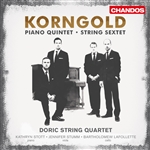
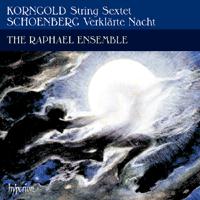 The
Chandos cover provides a good example of why you should
never judge a book by its cover � it looks so like the earlier
Doric recording of the Korngold quartets that I almost ignored
it. I’m glad that I didn’t � the performances are
every bit as fine as Gavin Dixon says.
The
Chandos cover provides a good example of why you should
never judge a book by its cover � it looks so like the earlier
Doric recording of the Korngold quartets that I almost ignored
it. I’m glad that I didn’t � the performances are
every bit as fine as Gavin Dixon says.
Comparisons with the Hyperion are complicated by the
couplings. Both performances are excellent and both recordings
are good, though only the Chandos comes in 24-bit format. If
you don’t have the Schoenberg in its sextet version, that
fact may marginally swing your choice in favour of the Raphael
Ensemble, but it�s a close call. The Hyperion cover is more
attractive, if that makes any difference, and the fact that
the CD is now available only from the Archive Service need be
no reflection upon its worth.
George GERSHWIN (1898-1937)
Piano Concerto in F (1925) [33:53]
Rhapsody No. 2 (1931) [15:54]
I Got Rhythm Variations (1934) [8:53]
Orion Weiss (piano)
Buffalo Philharmonic Orchestra/JoAnn Falletta � rec. November
2010. DDD.
Pdf booklet included.
NAXOS AMERICAN CLASSICS 8.559705 [58:40] � from classicsonline.com
(mp3) or stream from Naxos Music Library
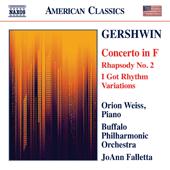 There�s
a veritable host of recordings of Rhapsody in Blue, some
of which are coupled with the Piano Concerto and/or the Second
Rhapsody, as on the 1955 Naxos Classical Archives recording
with Morton Gould and his Orchestra (9.80707, Rhapsody
in Blue, Piano Concerto and 3 Preludes � not available in
the USA)*, but these new, thoroughly idiomatic recordings are
very welcome. The music may not be quite as snappy as the better
known Rhapsody, but all the usual jaunty Gershwin trademarks
are there, as, indeed, they are in the foot-tapping variations
on I Got Rhythm. The mp3 transfer sounds fine and the
notes are short but to the point. This is one of those recordings
that you know are going to be excellent right from the start.
There�s
a veritable host of recordings of Rhapsody in Blue, some
of which are coupled with the Piano Concerto and/or the Second
Rhapsody, as on the 1955 Naxos Classical Archives recording
with Morton Gould and his Orchestra (9.80707, Rhapsody
in Blue, Piano Concerto and 3 Preludes � not available in
the USA)*, but these new, thoroughly idiomatic recordings are
very welcome. The music may not be quite as snappy as the better
known Rhapsody, but all the usual jaunty Gershwin trademarks
are there, as, indeed, they are in the foot-tapping variations
on I Got Rhythm. The mp3 transfer sounds fine and the
notes are short but to the point. This is one of those recordings
that you know are going to be excellent right from the start.
One small grumble � at 59 minutes, this is short measure. Could
we not also have had the Rhapsody in Blue, when the earlier
Naxos recording of that work with the Piano Concerto and American
in Paris with the Slovak RSO must surely now be superseded
by this new recording? In mitigation I note that nearly all
currently available recordings containing the Piano Concerto
offer short value � the Labegue sisters (Philips) even clock
in at under 45 minutes.
* £1.99 in the UK. The 1954 Pennario/Steinberg performance
of the Concerto is available at the same price (9.80531).
For some inexplicable reason amazon.co.uk think £7.49
a fair price to charge for this and for the new Naxos recording
and hmvdigital.com are charging an even less feasible £7.99
for the new album!
Sargent�s Overtures
Arthur SULLIVAN Iolanthe
Overture* [7:20]
Hector BERLIOZ Le Carnaval
Romain Overture** [9:29]
Felix MENDELSSOHN The
Hebrides Overture** [9:10]
Bedřich SMETANA The
Bartered Bride Overture** [6:52]
Gioachino ROSSINI (1792-1868)
Il Barbiere di Siviglia Overture [7:36]
Guglielmo Tell Overture [12:25]
Il viaggio a Reims Overture [6:51]
Semiramide Overture [12:49]
Pro Arte Orchestra*; Royal Philharmonic Orchestra**; Vienna
Philharmonic Orchestra/Sir Malcolm Sargent
BEULAH 7PD13 [72:38] � from iTunes
(mp3)
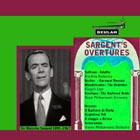 I
mentioned this album briefly back in February and never got
round to dealing with it fully. There aren’t many recent
recordings of this type � most of the Rossini overture recordings
are almost of the same vintage as these Sargent performances.
Perhaps it�s just that the likes of Sir Malcolm did it all so
well that there�s no competition; certainly he brings off everything
here extremely well. The Sullivan was recorded with the Pro
Arte Orchestra, the Rossini with the Vienna Philharmonic (not
the RPO, as stated by iTunes) and the rest with the Royal Philharmonic.
I
mentioned this album briefly back in February and never got
round to dealing with it fully. There aren’t many recent
recordings of this type � most of the Rossini overture recordings
are almost of the same vintage as these Sargent performances.
Perhaps it�s just that the likes of Sir Malcolm did it all so
well that there�s no competition; certainly he brings off everything
here extremely well. The Sullivan was recorded with the Pro
Arte Orchestra, the Rossini with the Vienna Philharmonic (not
the RPO, as stated by iTunes) and the rest with the Royal Philharmonic.
The VPO Rossini recording appeared in 1961 � just the four overtures
on a whole LP, which at £2 (over £40 in modern values)
looks like pretty poor value by comparison with iTunes� £7.99
($9.99) for twice the music. If Sargent seems a little more
restrained here than with the English orchestras, it�s not much
of a problem � what the music loses in sparkle it gains in warmth.
The other overtures come from a mid-price recording which also
appeared in 1961, omitting two items that weren’t thought
up to standard by Edward Greenfield. What appears here is every
bit as welcome as it was then judged to be: ‘a good enjoyable
collection at a bargain price’. I especially enjoyed the
Smetana � if you want more, Sargent�s excellent recording of
Má Vlast is available inexpensively on Classics
for Pleasure, as also, of course, are several of his Gilbert
and Sullivan recordings. The Meistersinger and Scala
di Seta music from that second LP are available on 24BX13
and 25BX13 respectively � see February 2012/1 Roundup.
As well as the preview tracks which I received from Beulah,
I’ve also listened to the iTunes transfers. Inevitably
the recordings show their age slightly, but by no means so much
as to spoil your listening pleasure. I enjoyed this very much.
Other Beulah
reissues
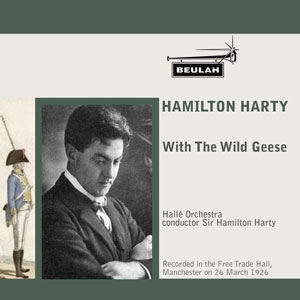
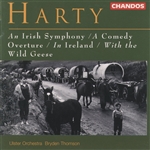 Sir
Hamilton Harty�s own performances of With the Wild Geese
[15:43] and the Scherzo from his Irish Symphony (‘The girl
I left behind me’) [2:53] look very interesting � and,
indeed, it�s very good to hear his interpretation of his own
music on 12BX25
and 13BX25 respectively,
but the recordings from 1926 � rated ‘true and worthy’
in its day � and 1929 sound as thin as the dates imply. Nevertheless,
these recordings give some insight into how the composer thought
his music should be performed, though the exigencies of 78 side-lengths
have necessitated some pruning.
Sir
Hamilton Harty�s own performances of With the Wild Geese
[15:43] and the Scherzo from his Irish Symphony (‘The girl
I left behind me’) [2:53] look very interesting � and,
indeed, it�s very good to hear his interpretation of his own
music on 12BX25
and 13BX25 respectively,
but the recordings from 1926 � rated ‘true and worthy’
in its day � and 1929 sound as thin as the dates imply. Nevertheless,
these recordings give some insight into how the composer thought
his music should be performed, though the exigencies of 78 side-lengths
have necessitated some pruning.
The least expensive download of a recommendable modern performance
(1980 and 1983) of the complete Irish Symphony and With the
Wild Geese comes from Chandos and theclassicalshop.net on
CHAN7034
[77:29] � £6.00 in mp3 or £7.99 in lossless sound.
Make sure that you choose the catalogue number that I’ve
given: there�s another, more expensive, single-disc release
of the same performances. The performances from the Ulster
Orchestra and Bryden Thomson are also available as
part of a box set (CHAN10194).
See Rob Barnett�s review
of an earlier release of the Chandos set which he thought irresistible.
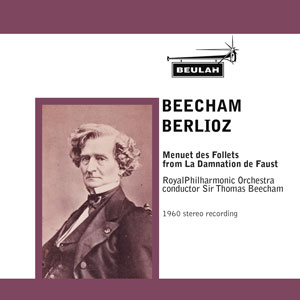 Sir
Thomas Beecham�s recording of the Menuet des Follets
from Act 3 of Berlioz�s Damnation de Faust was
made much more recently (13BX11
[5:36] 1960, stereo) and both performance and recording are
highly recommendable, unless you bought the multi-CD EMI French
Collection on which it�s included or intend to download
the set in 320kb/s mp3 for £14.99 from hmvdigital.com.
His magic is also at work in Saint-Saëns Bacchanale (15BX11
[7:18]) and Danse des prêtresses from Samson
et Dalila (14BX11
[2:27]) � excellent value if you didn’t obtain them as
part of the French Connection.
Sir
Thomas Beecham�s recording of the Menuet des Follets
from Act 3 of Berlioz�s Damnation de Faust was
made much more recently (13BX11
[5:36] 1960, stereo) and both performance and recording are
highly recommendable, unless you bought the multi-CD EMI French
Collection on which it�s included or intend to download
the set in 320kb/s mp3 for £14.99 from hmvdigital.com.
His magic is also at work in Saint-Saëns Bacchanale (15BX11
[7:18]) and Danse des prêtresses from Samson
et Dalila (14BX11
[2:27]) � excellent value if you didn’t obtain them as
part of the French Connection.
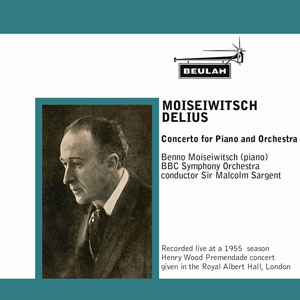 The
live prom recording of Delius�s Concerto for piano and orchestra
with Benno Moiseiwitsch and the BBC Symphony Orchestra
conducted by Sir Malcolm Sargent dates from 1955
(1-2BX186 [19:07]).
The recording is not brilliant, even for its date. Beulah have
not been able to tidy up the sound any better than Guild did
on their release (GHCD2326), but the stylish performance
shines through. As Jonathan Woolf wrote of that Guild reissue
� review
� if you can tolerate the sound you will be rewarded with a
fine performance. Those who don’t wish the Rachmaninov
concerto which was Guild�s coupling will find the Beulah reissue
especially valuable.
The
live prom recording of Delius�s Concerto for piano and orchestra
with Benno Moiseiwitsch and the BBC Symphony Orchestra
conducted by Sir Malcolm Sargent dates from 1955
(1-2BX186 [19:07]).
The recording is not brilliant, even for its date. Beulah have
not been able to tidy up the sound any better than Guild did
on their release (GHCD2326), but the stylish performance
shines through. As Jonathan Woolf wrote of that Guild reissue
� review
� if you can tolerate the sound you will be rewarded with a
fine performance. Those who don’t wish the Rachmaninov
concerto which was Guild�s coupling will find the Beulah reissue
especially valuable.












